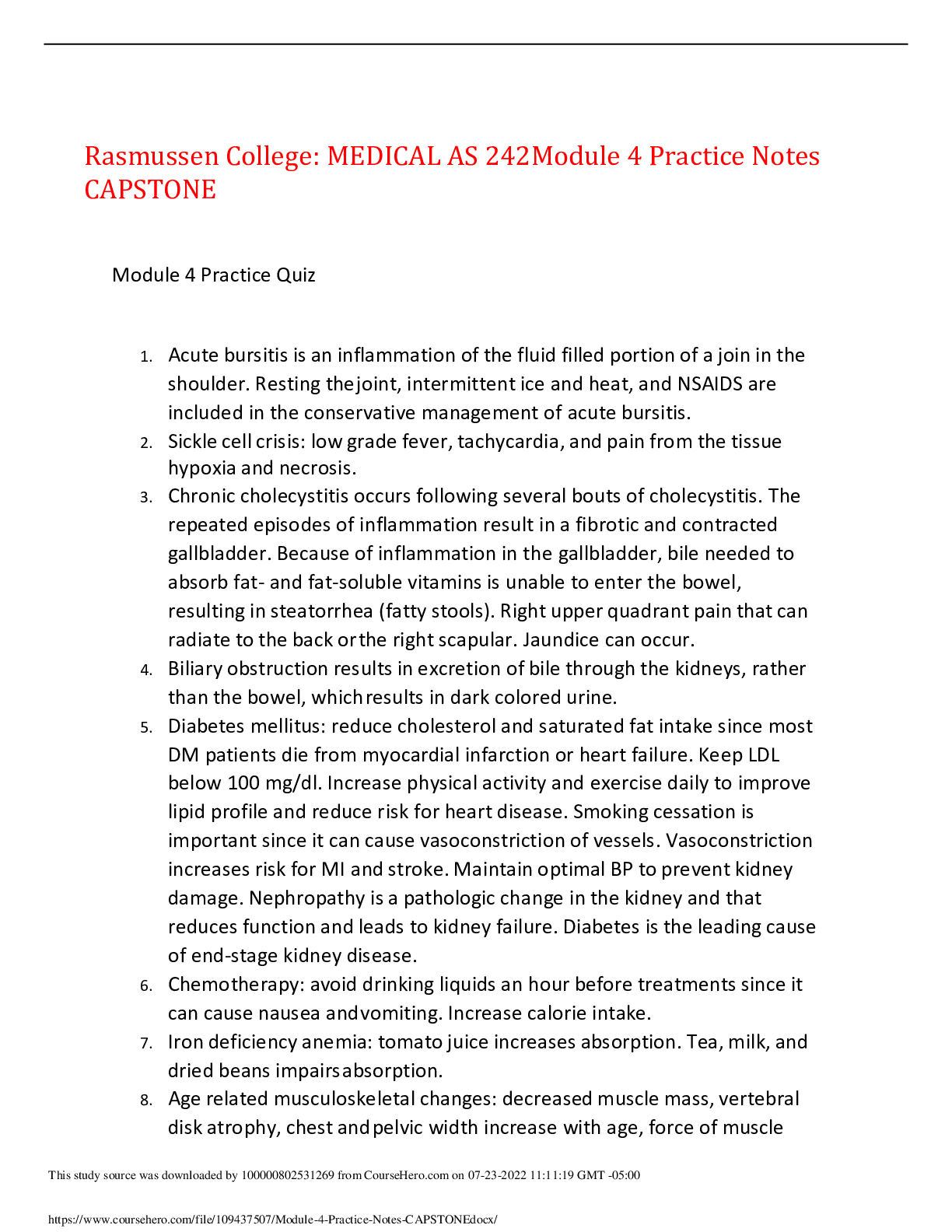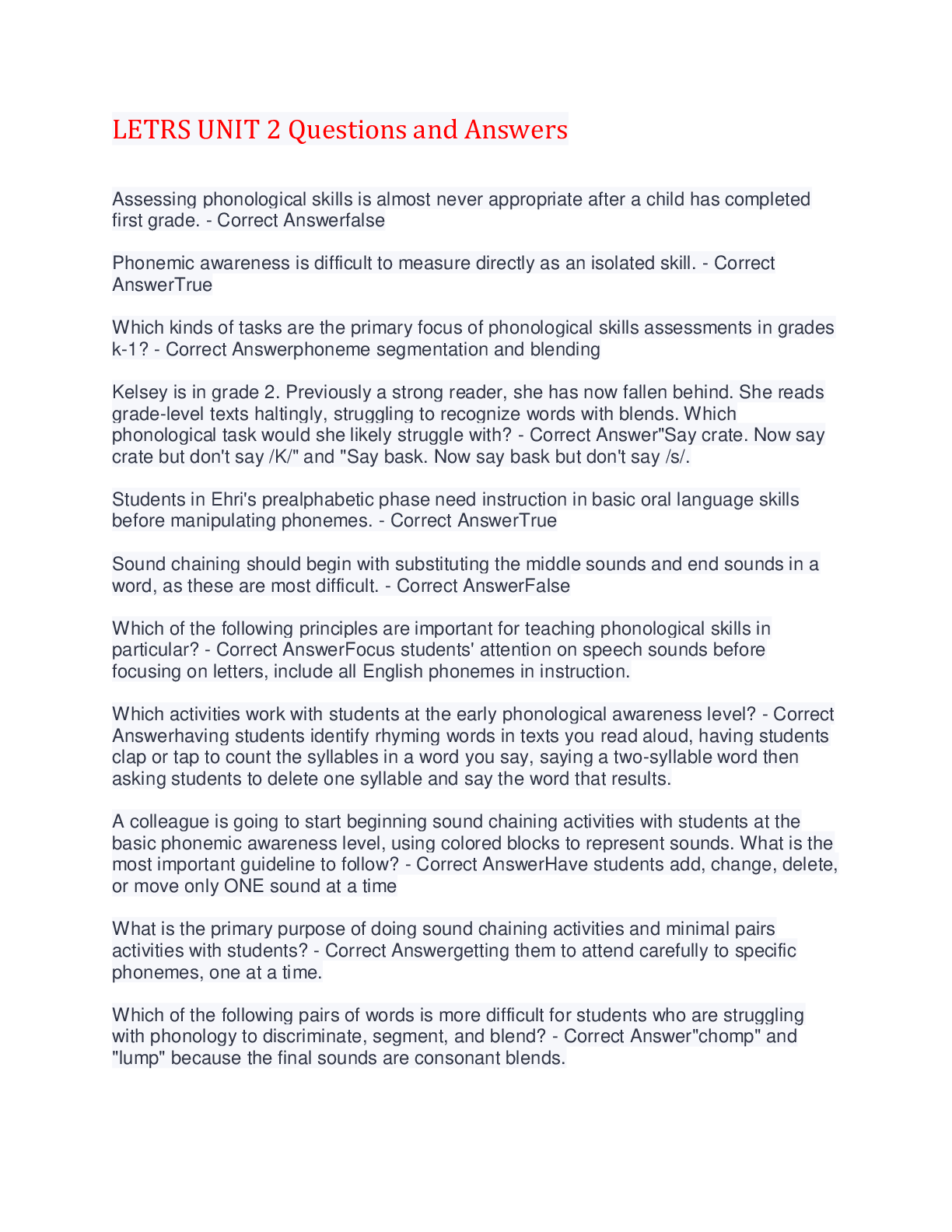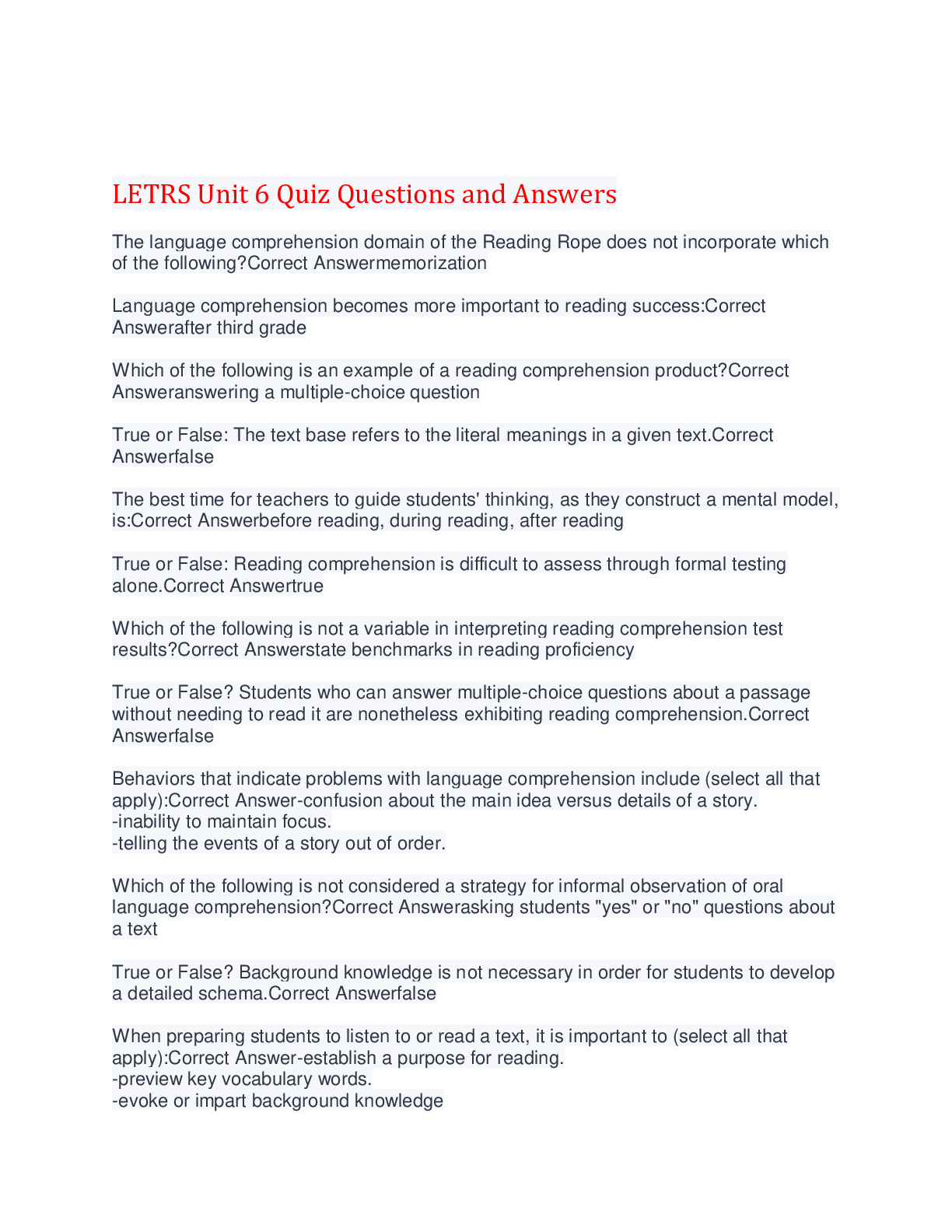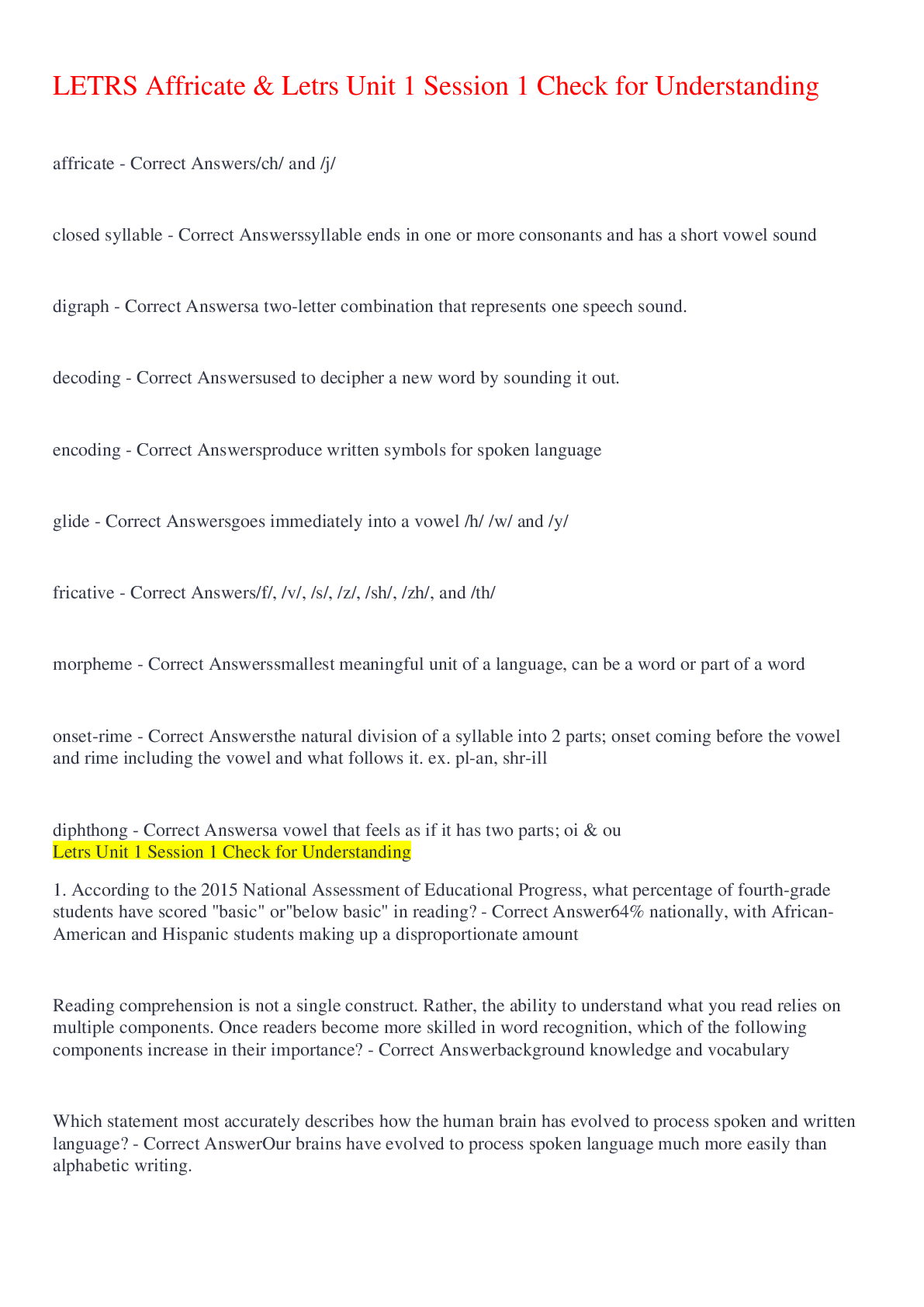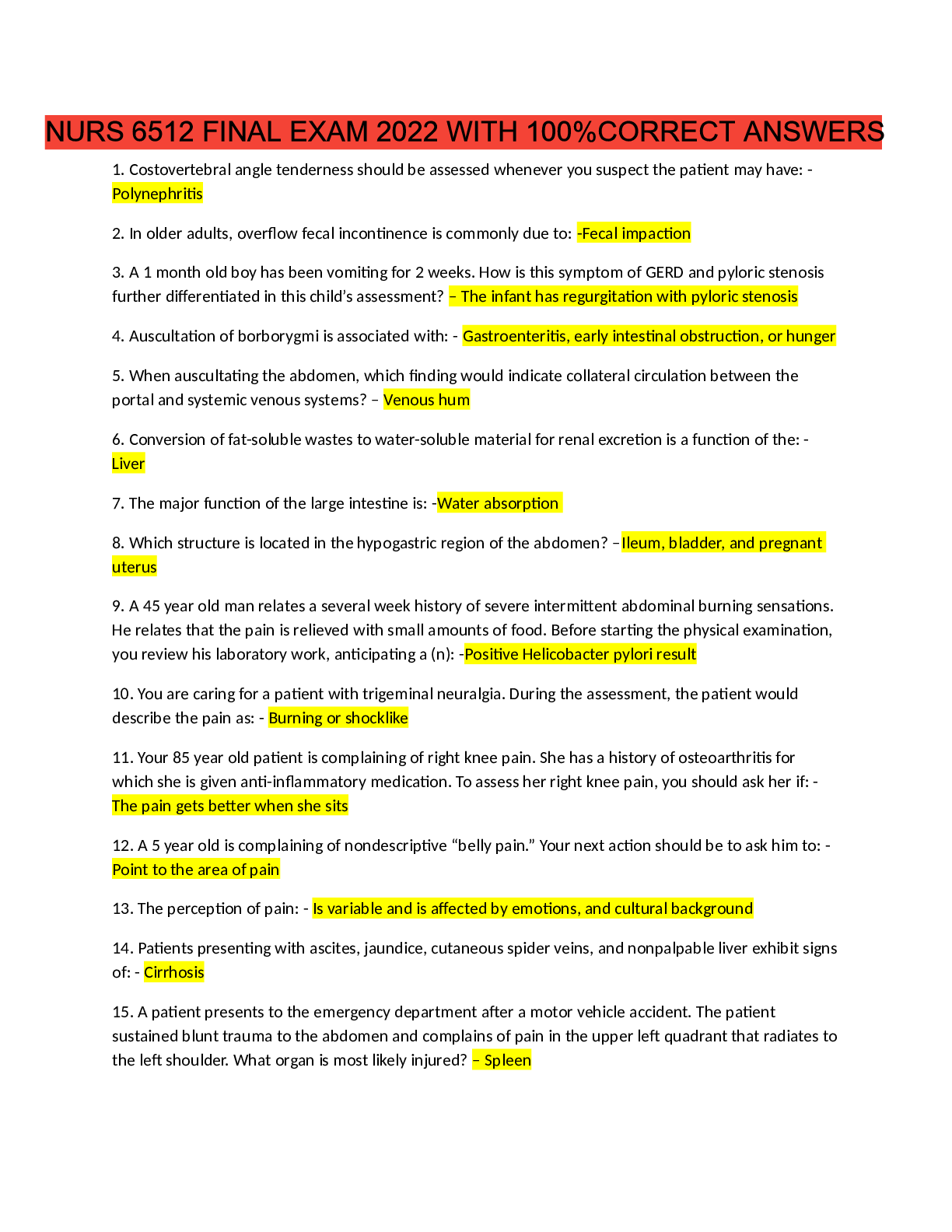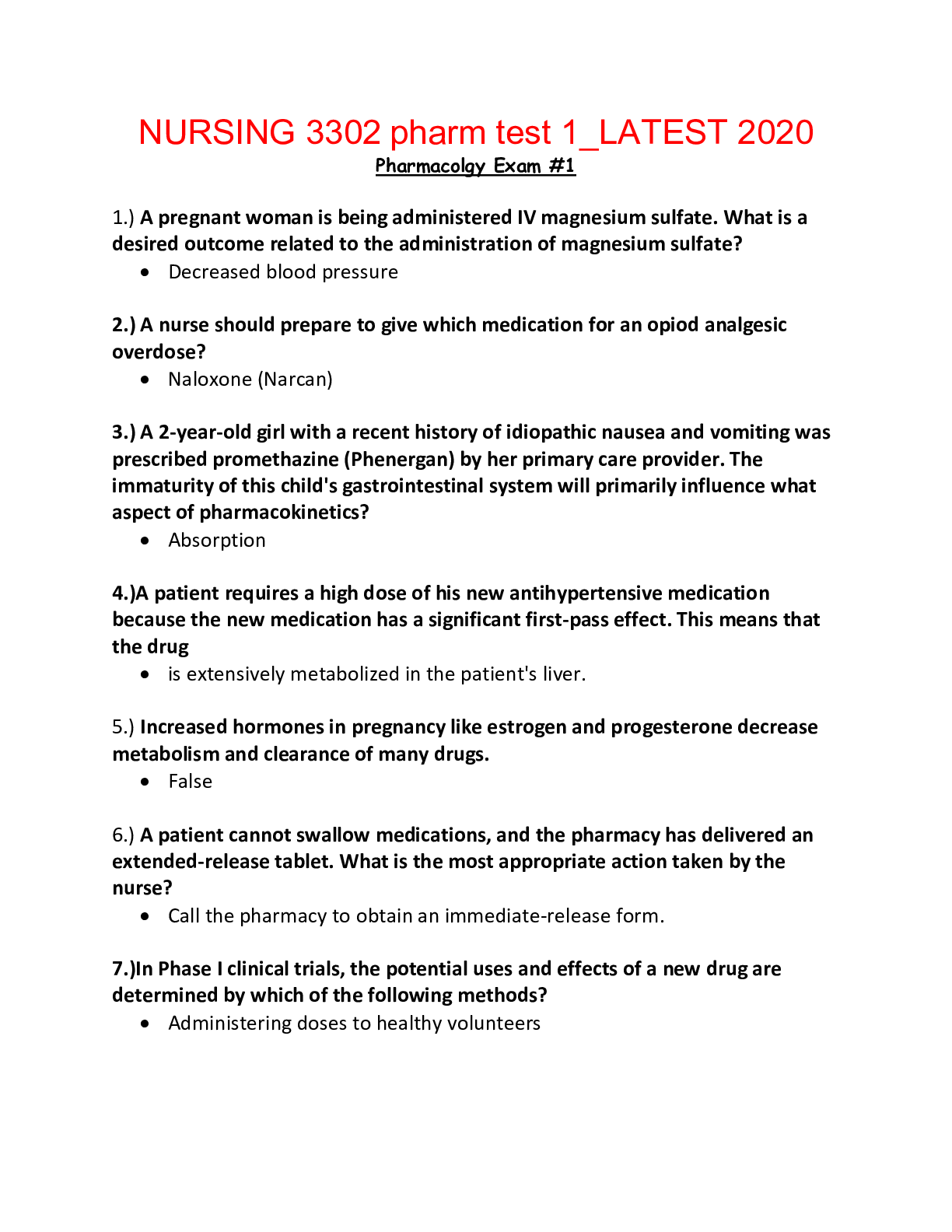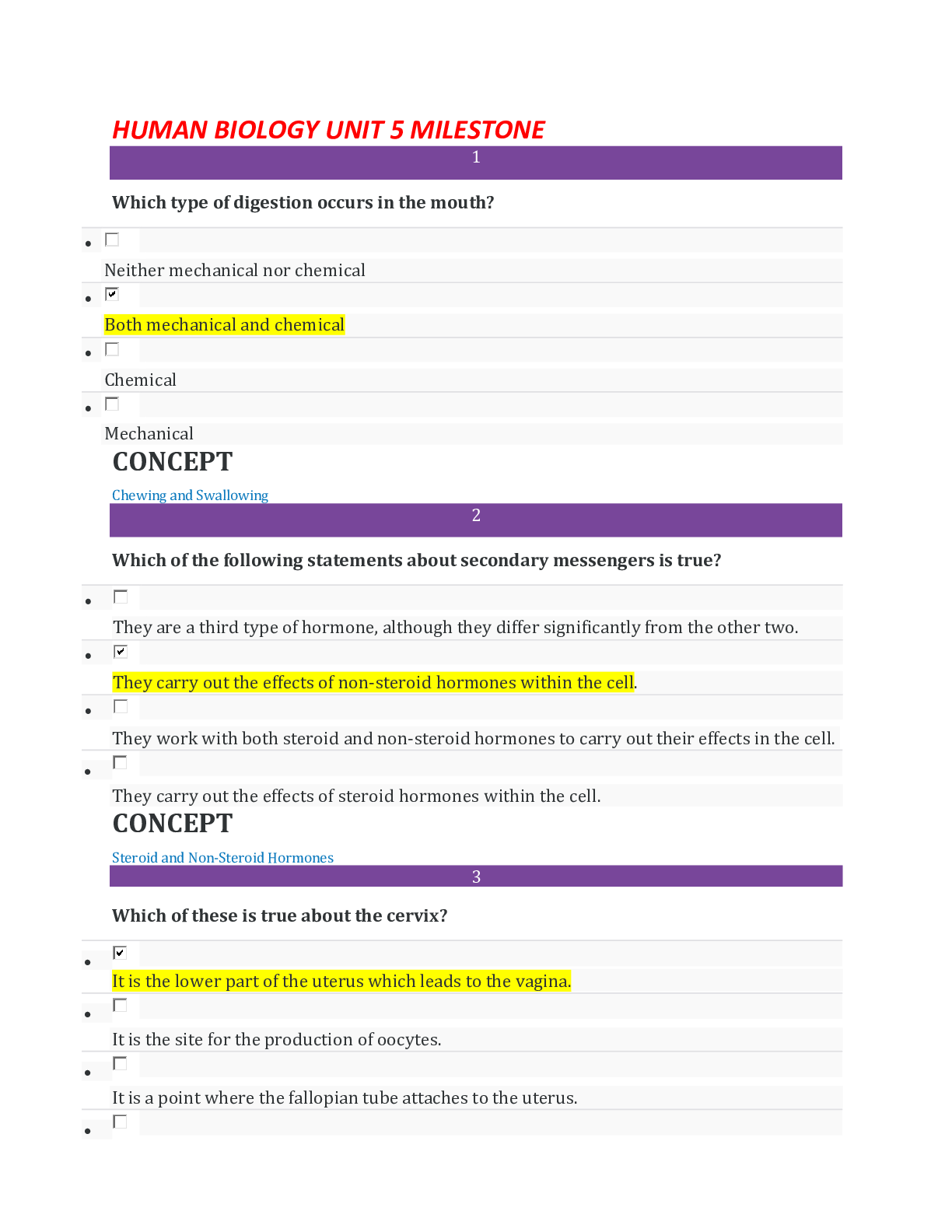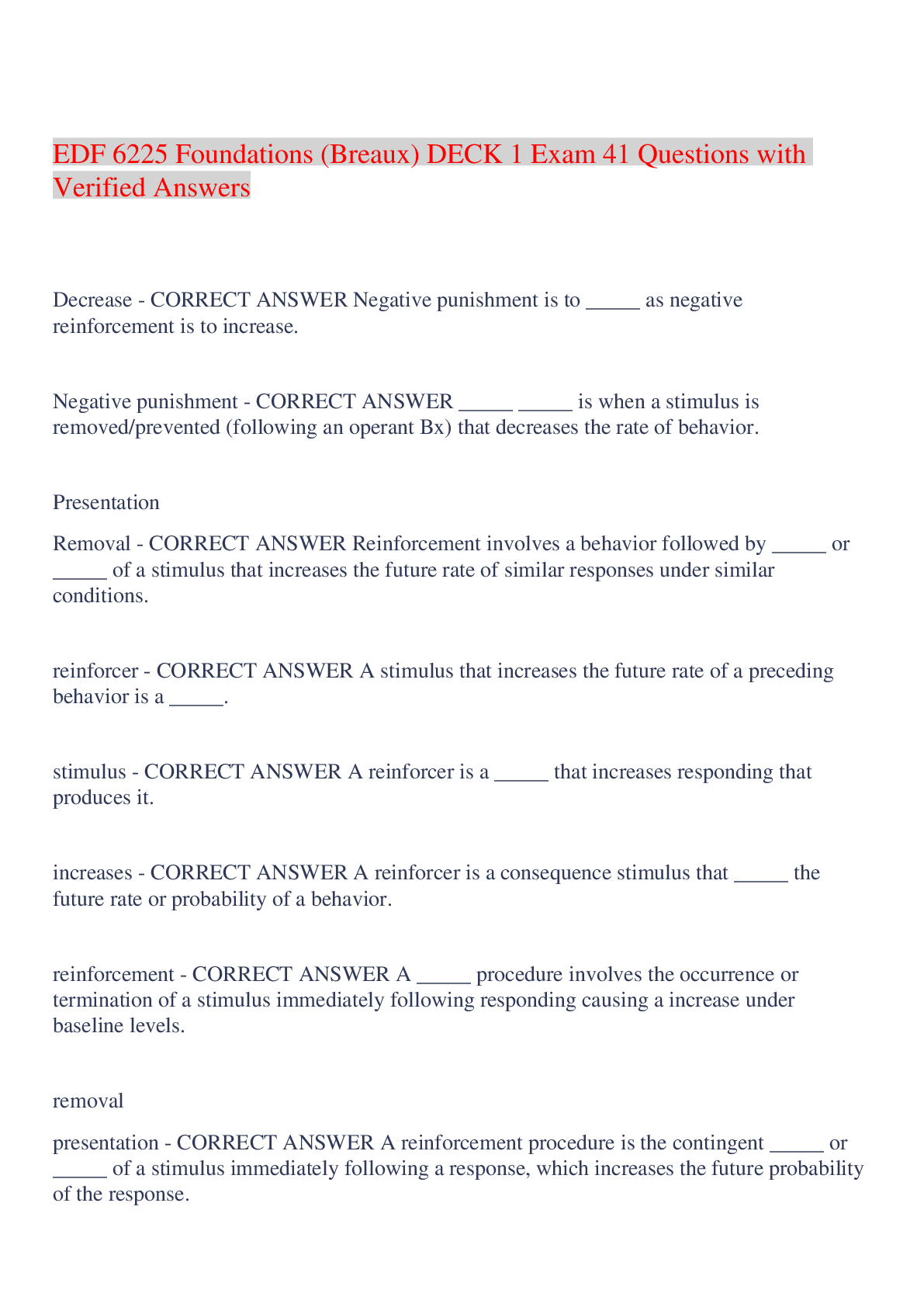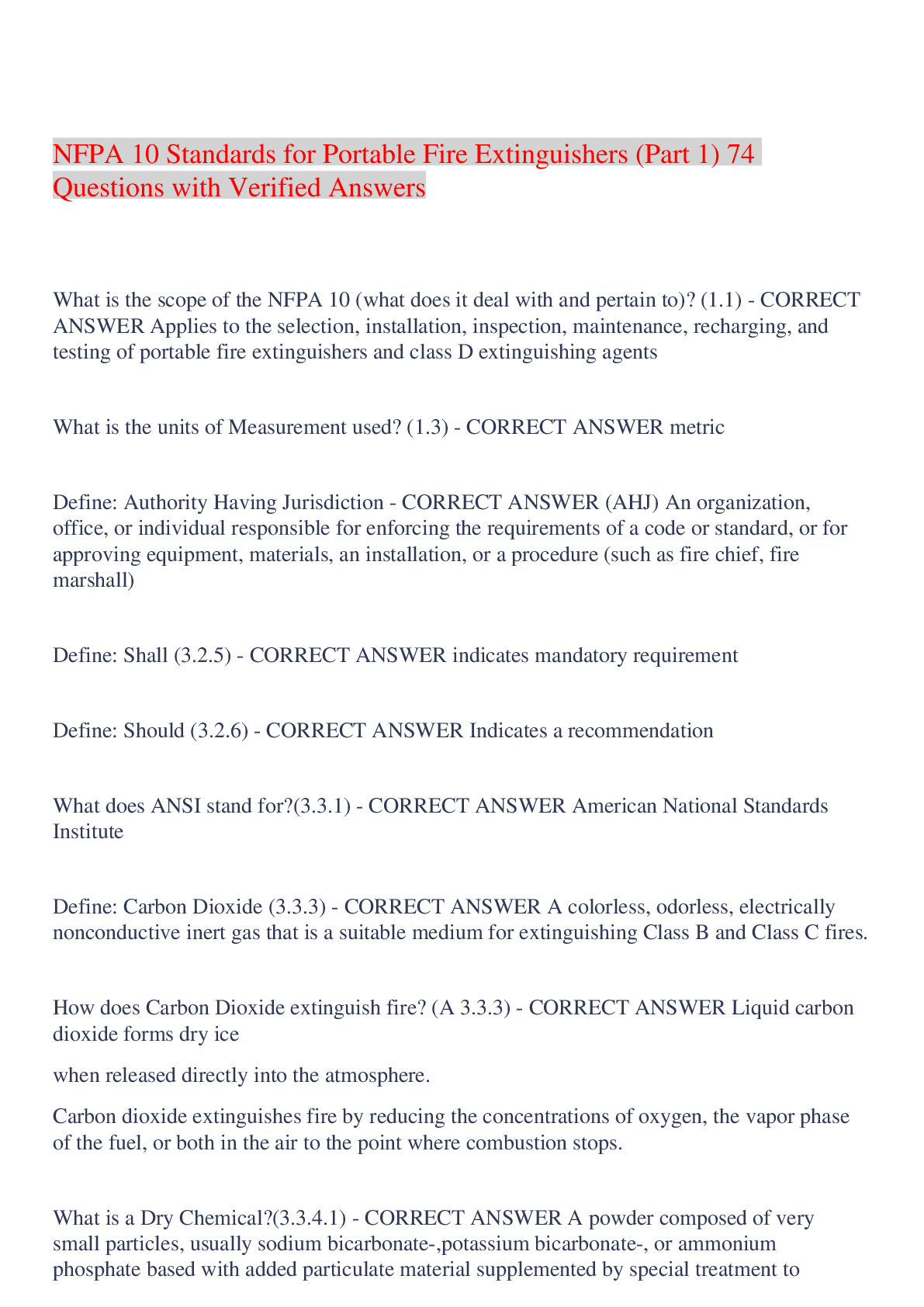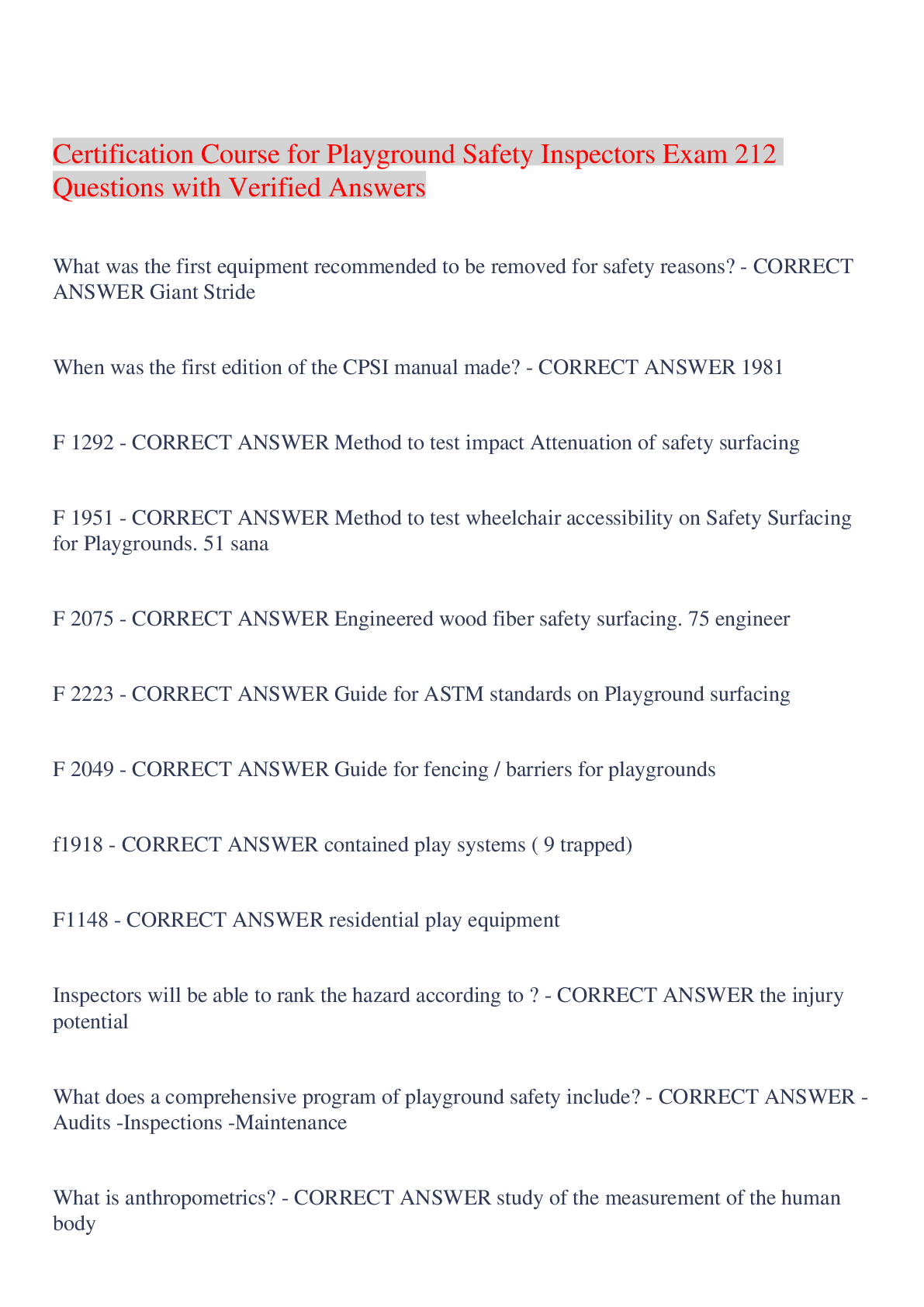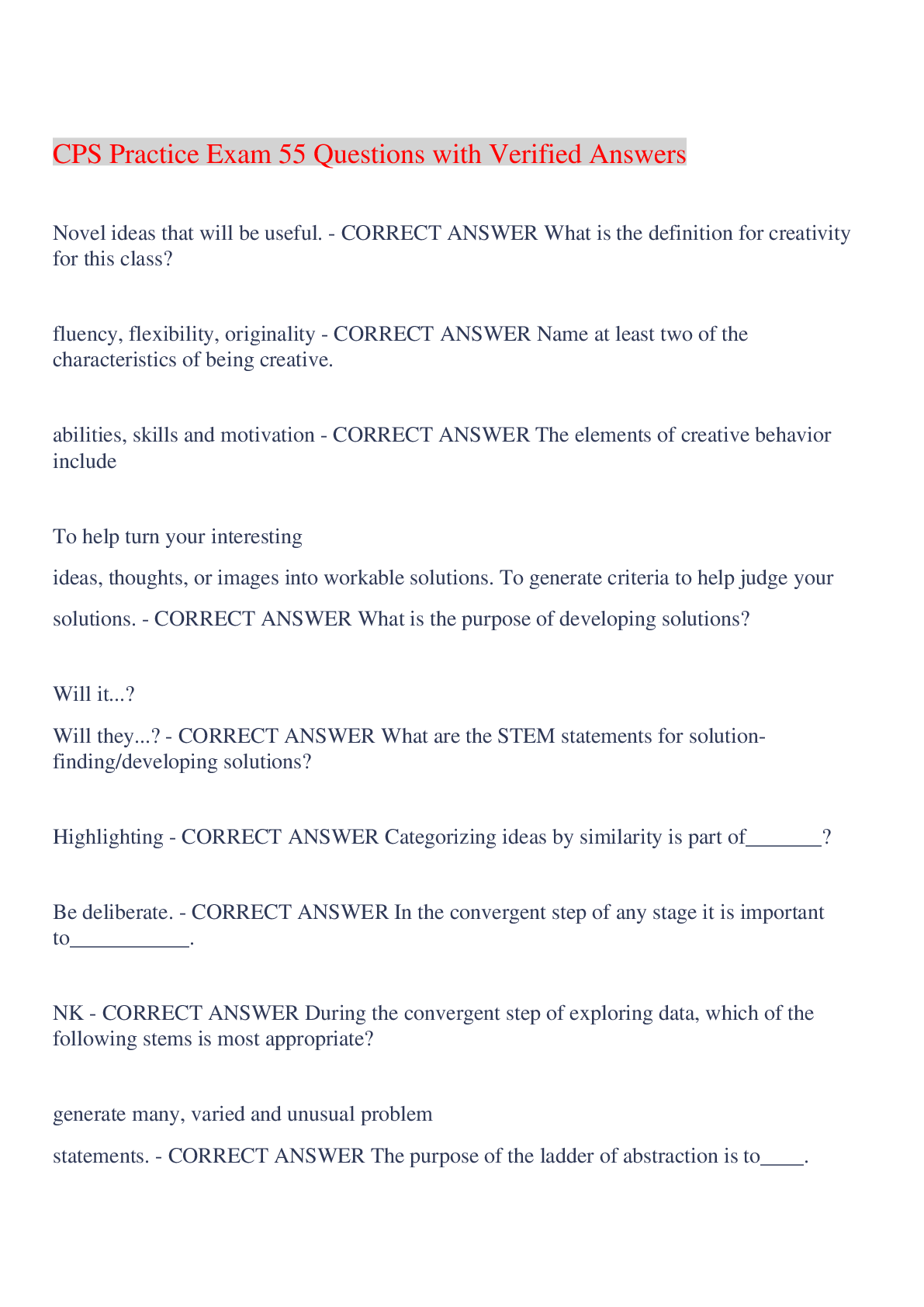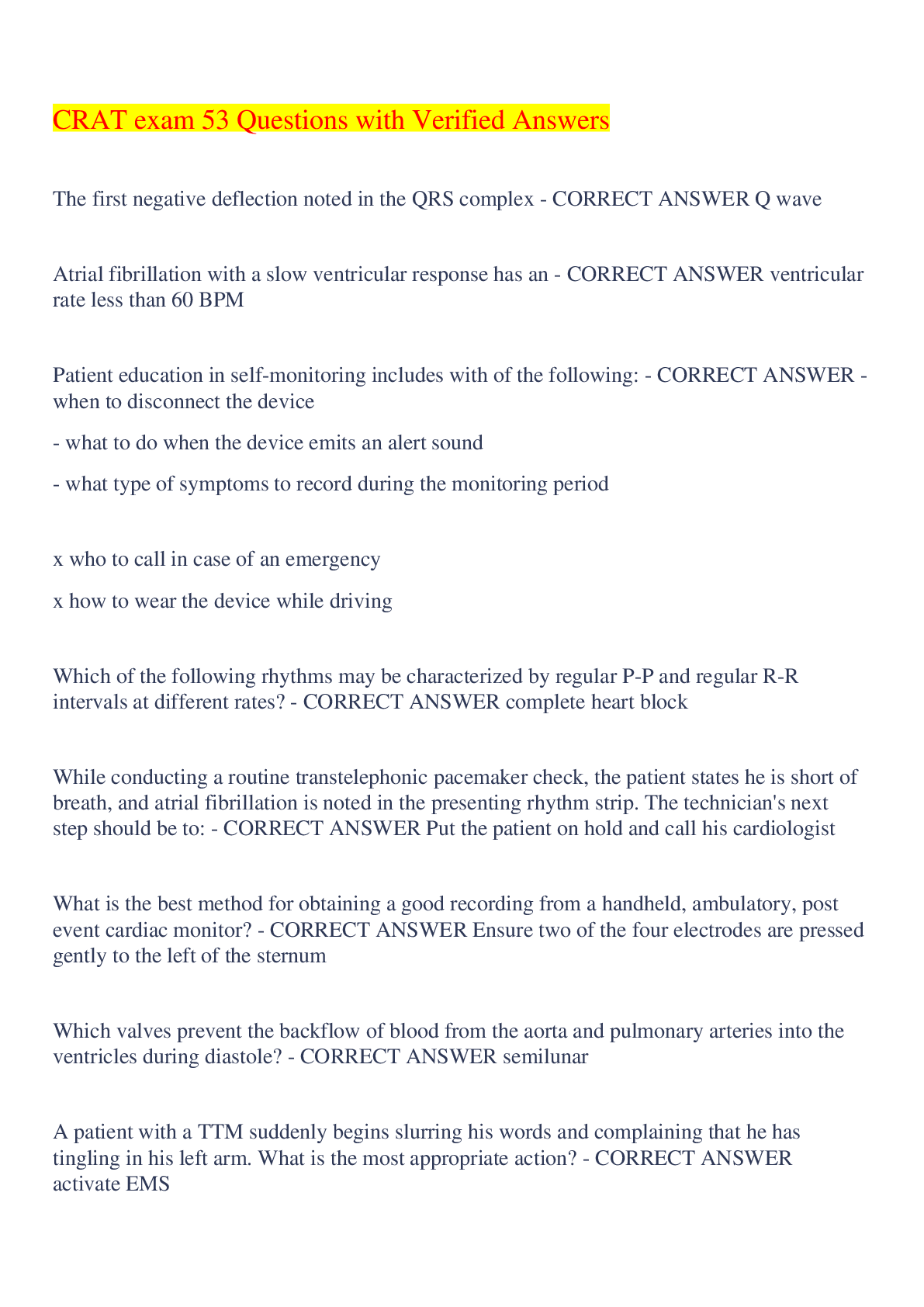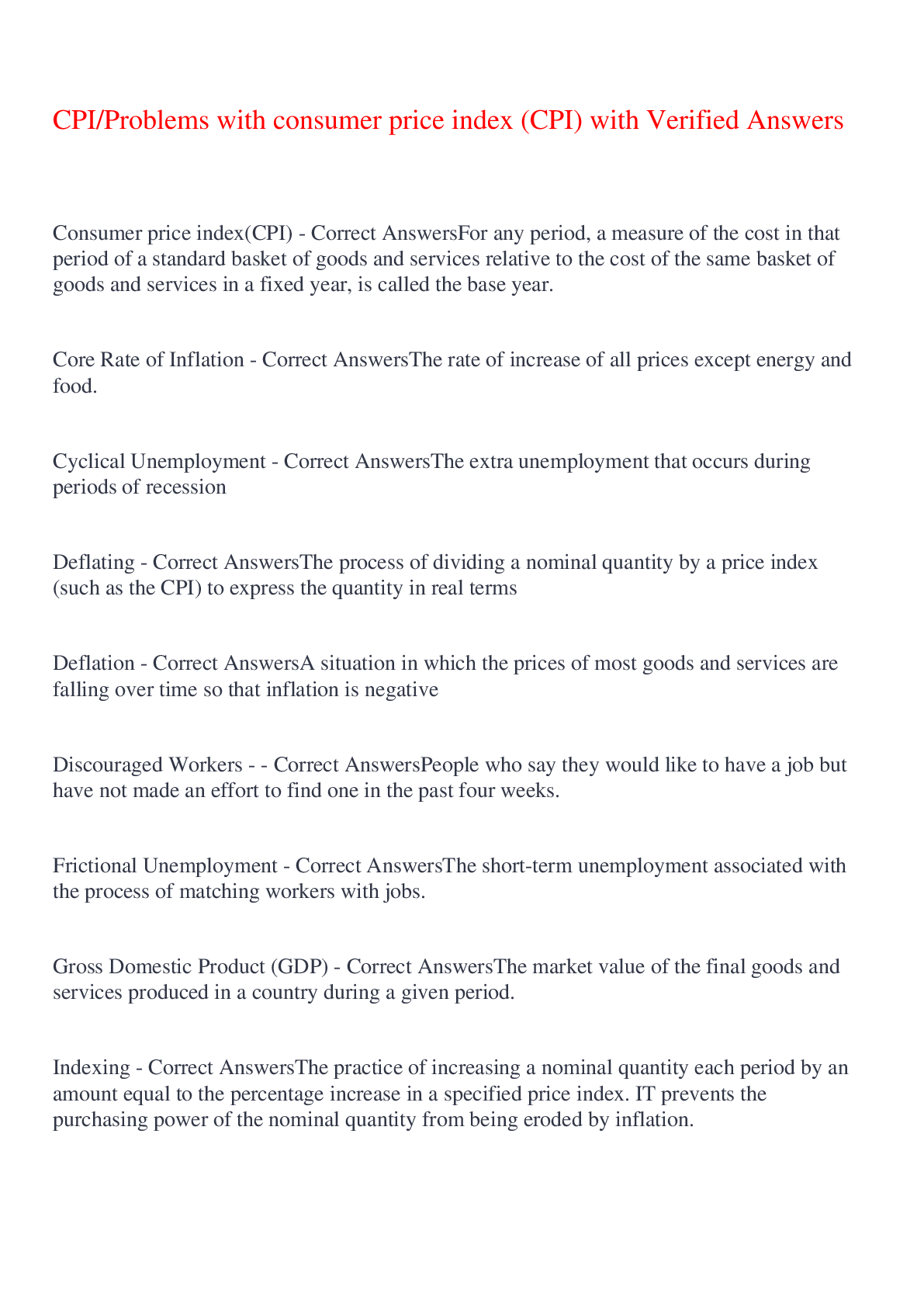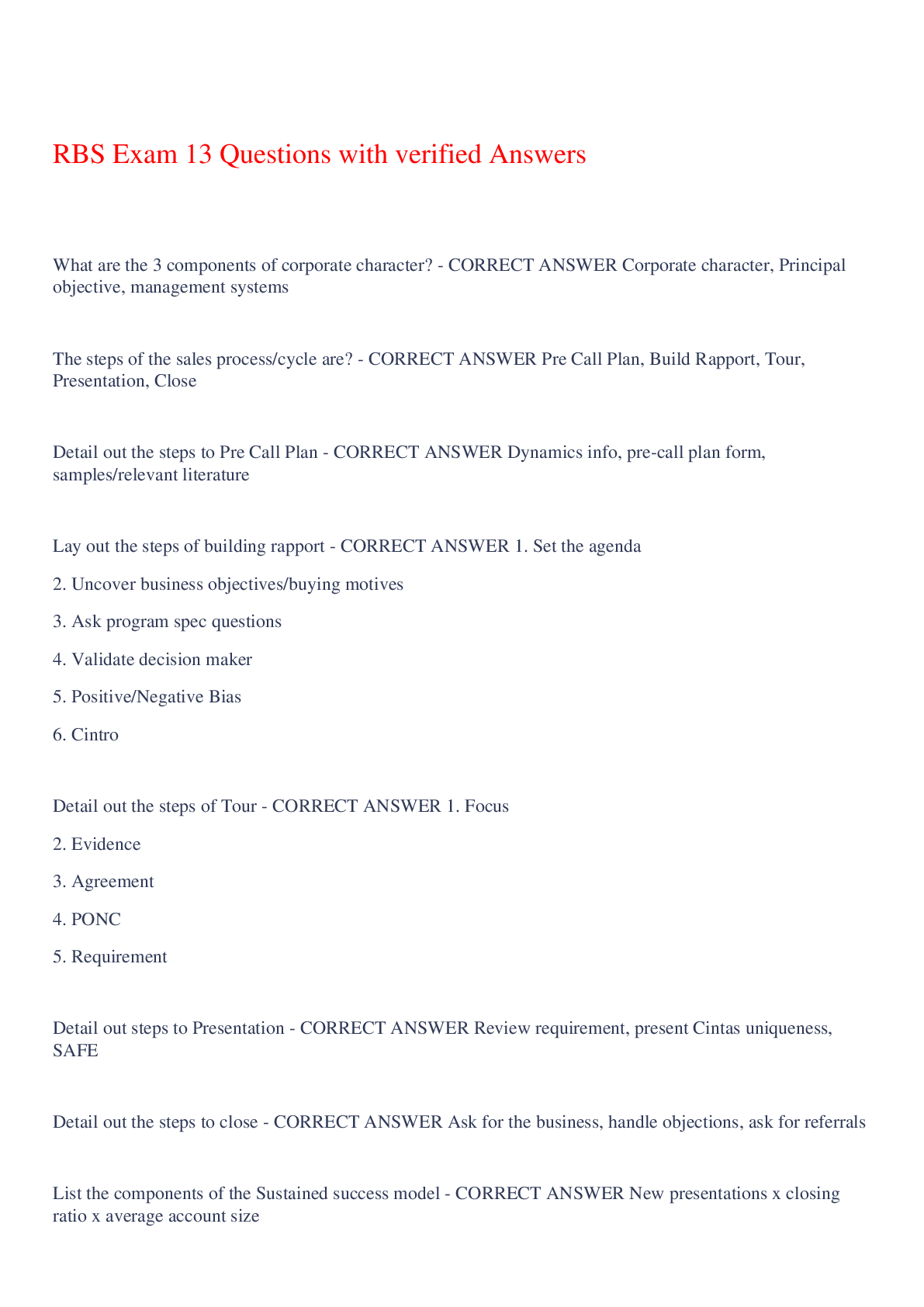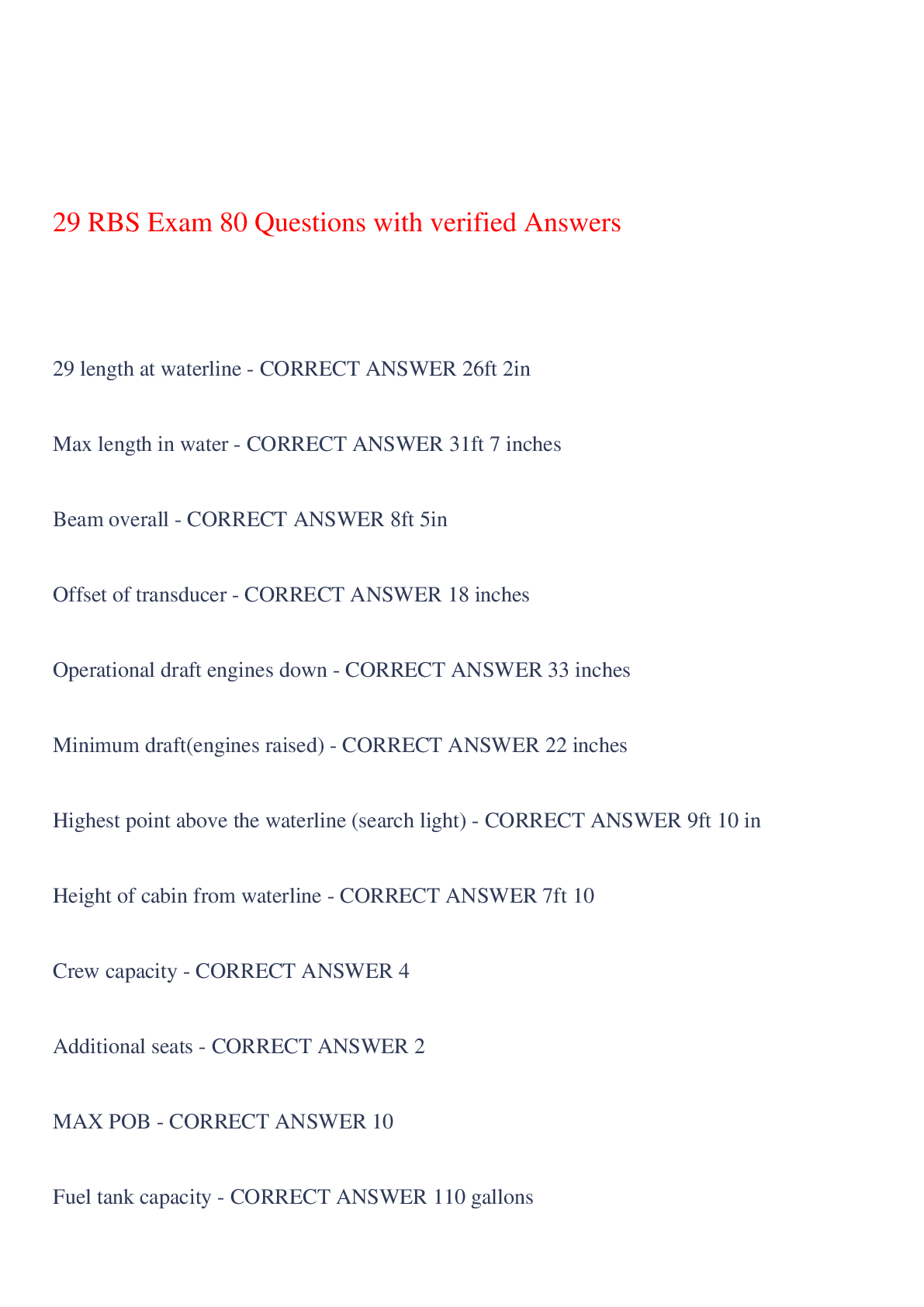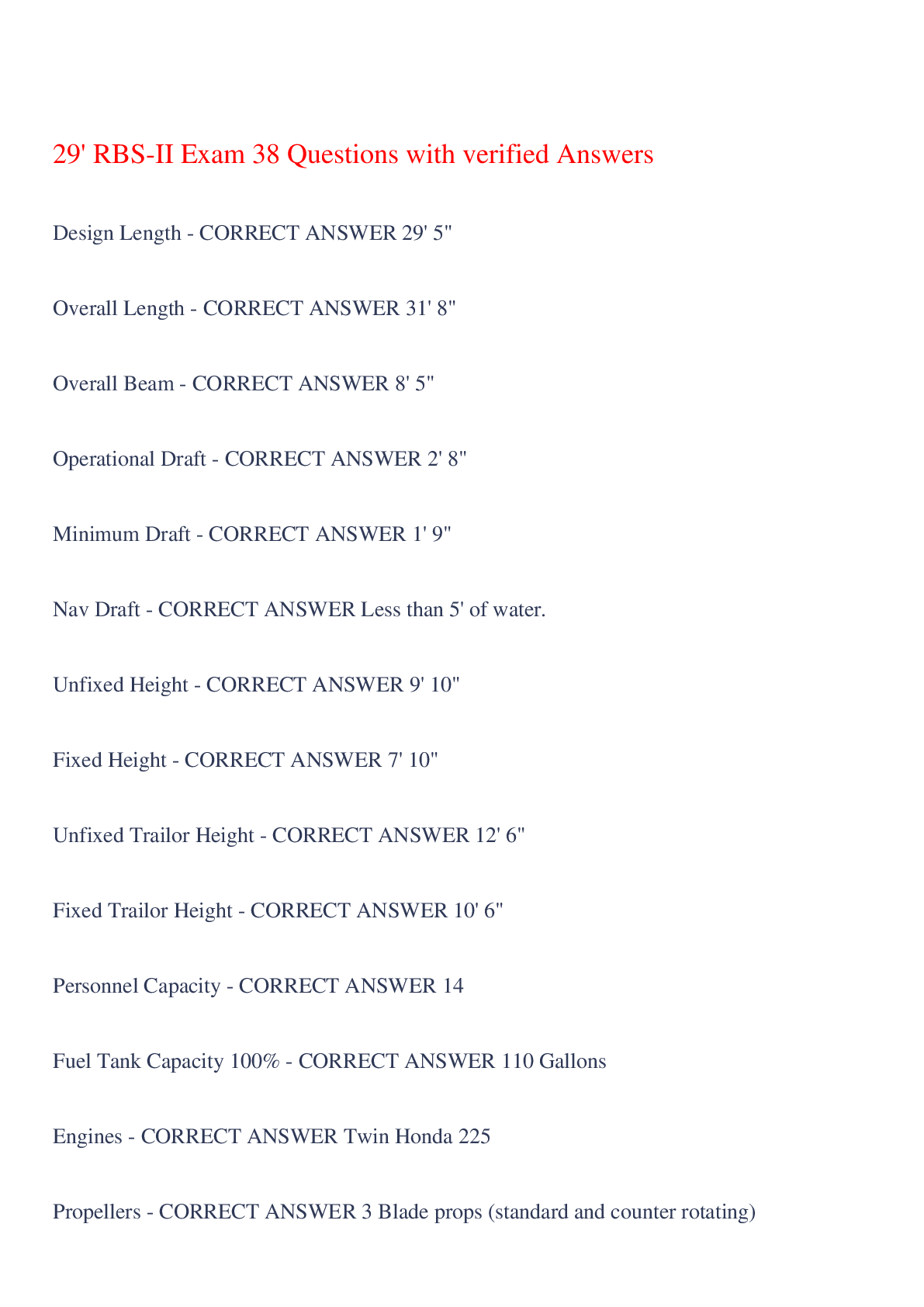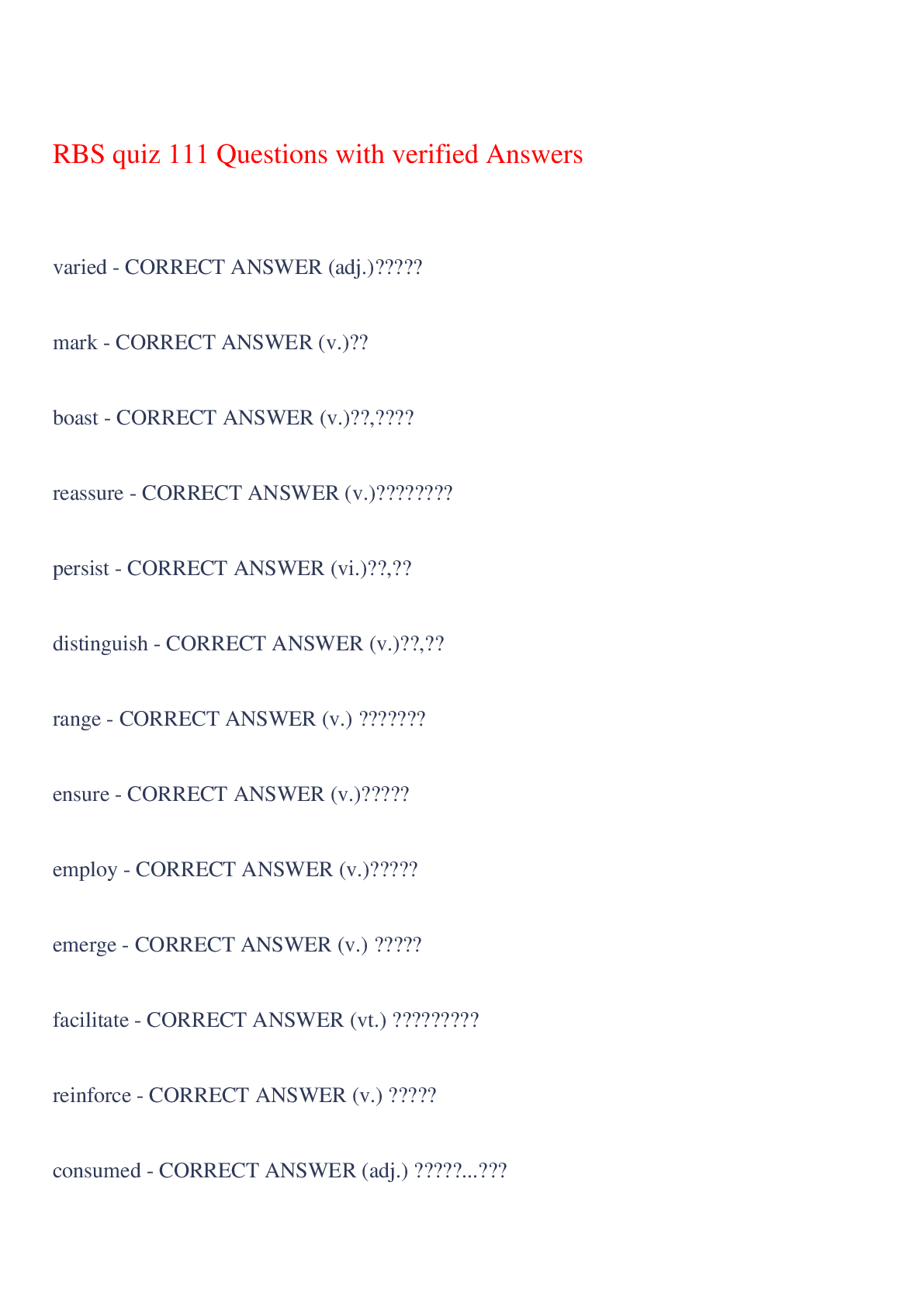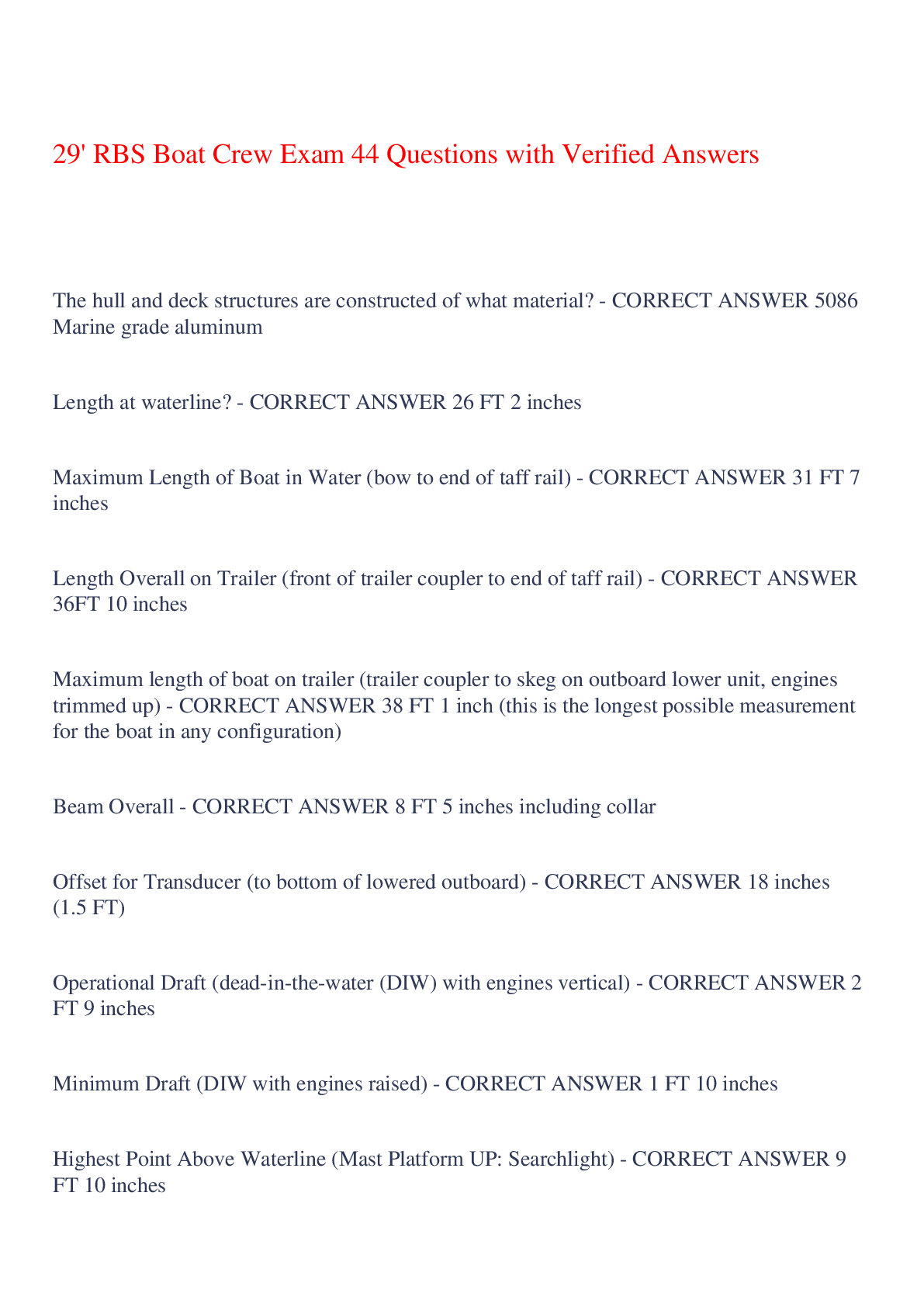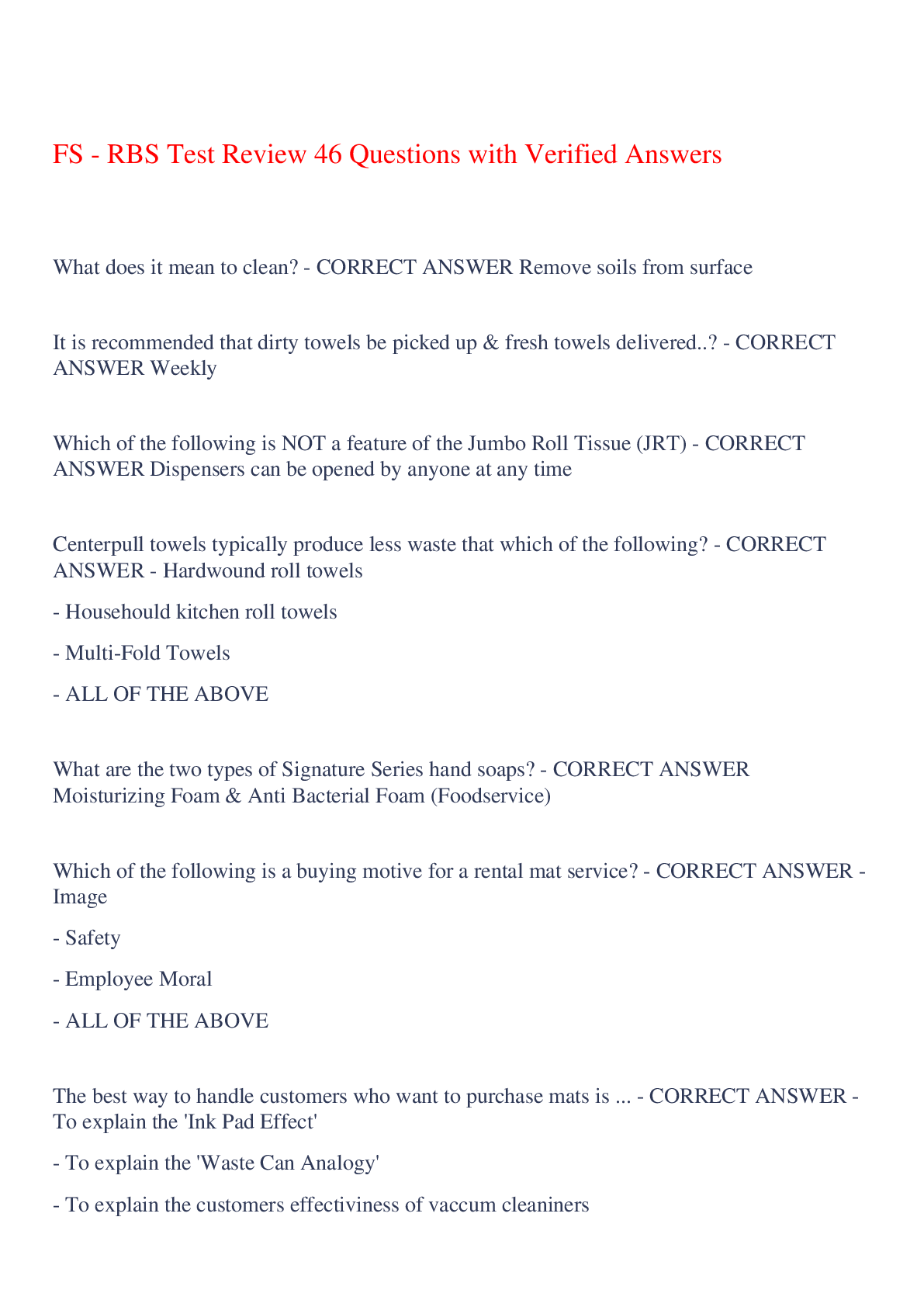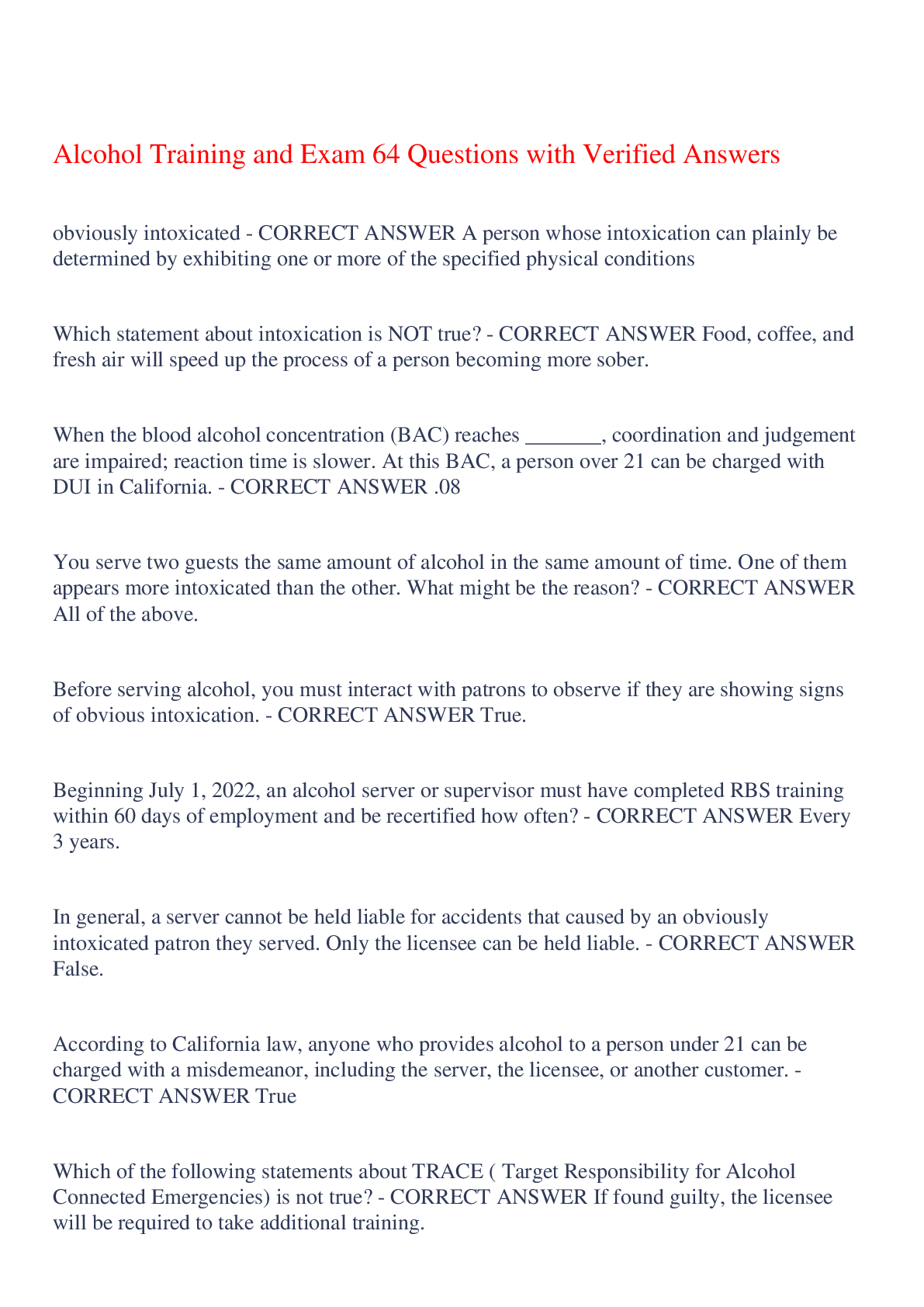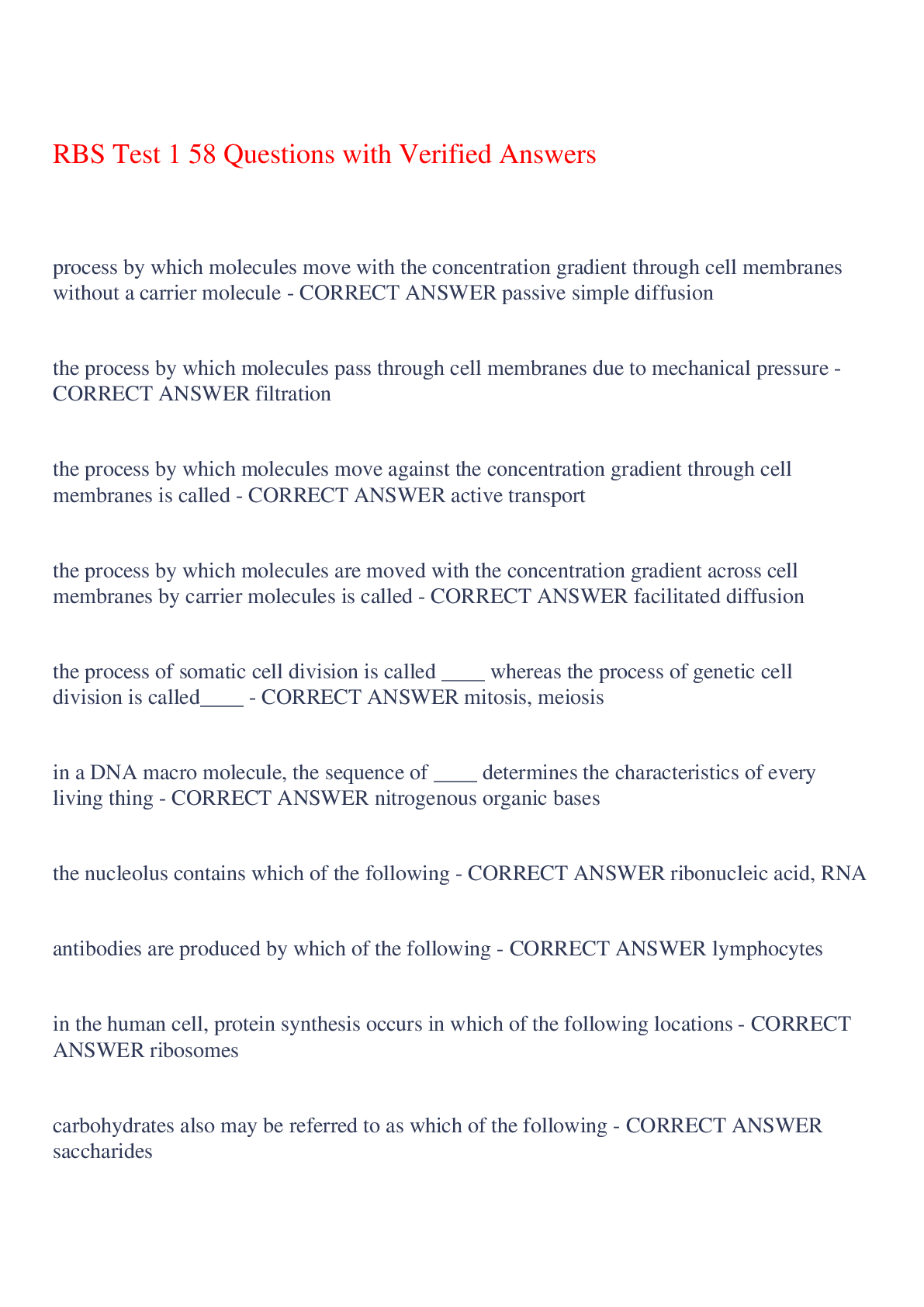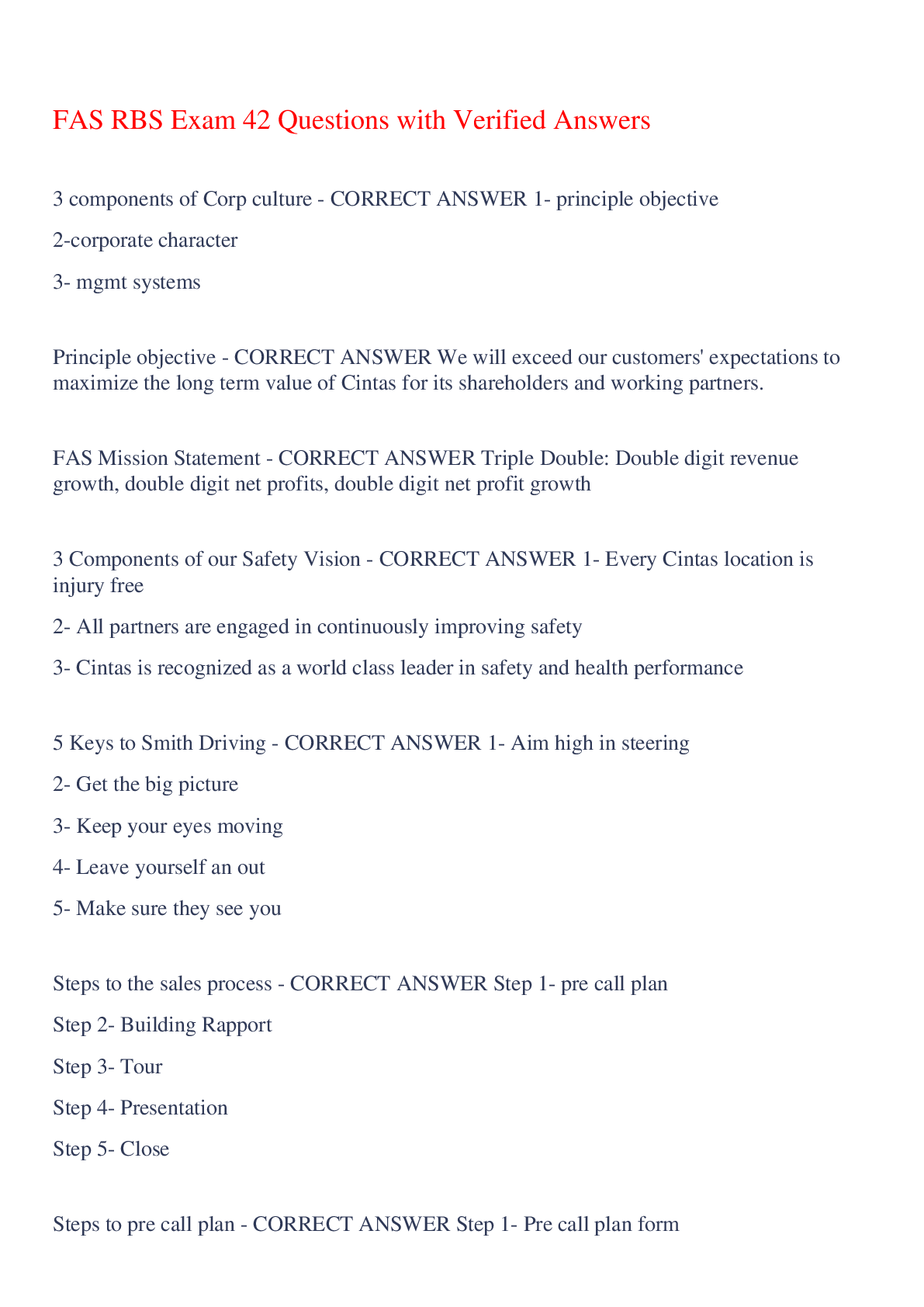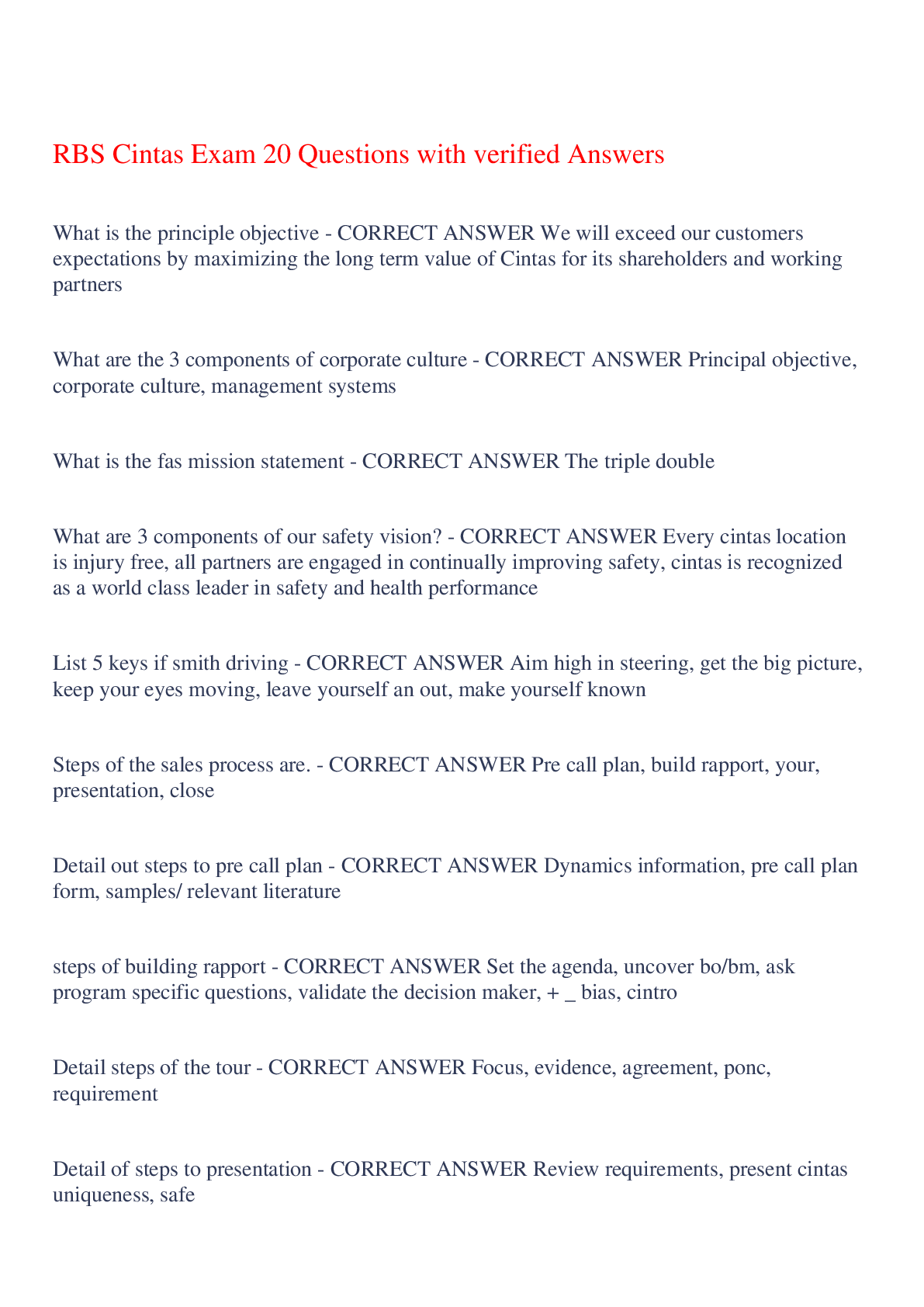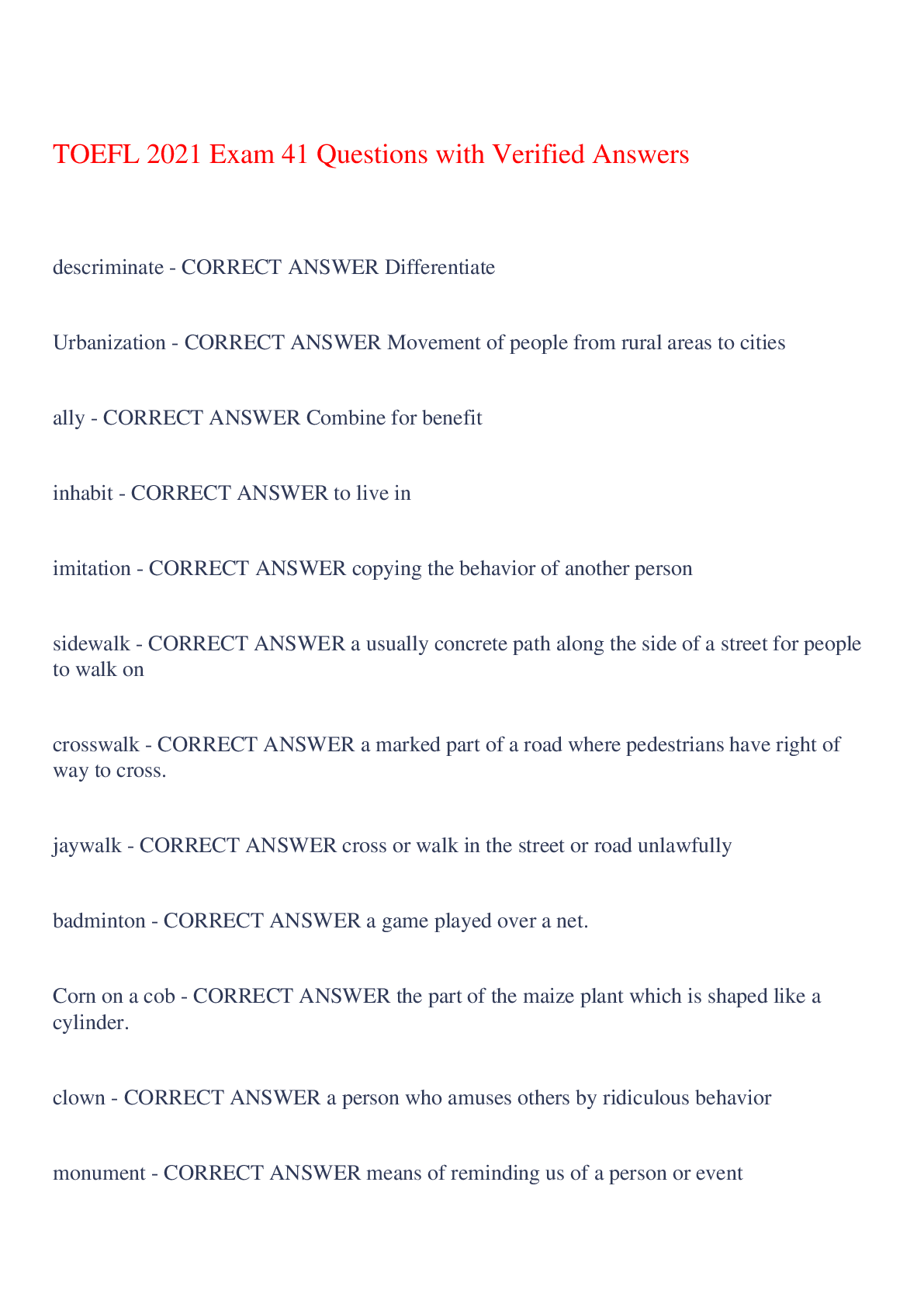NCLEX Exam 2|115 Questions with Verified Answers,100% CORRECT
Document Content and Description Below
NCLEX Exam 2|115 Questions with Verified Answers A patient comes to the clinic for a 4-week follow-up after starting Fluoxetine. What is the highest priority assessment question the nurse should ... ask? A. "How have you been sleeping?" B. "Did you drive to the clinic today?" C. "Has your stomach felt uncomfortable?" D. "Have you experienced thoughts of hurting yourself?" - CORRECT ANSWER D. "Have you experienced thoughts of hurting yourself?" Prior to initiating a tricyclic antidepressant (TCA), the nurse should evaluate which of the patient's diagnostic tests? A. Electroencephalogram (EEG) B. Electrocardiogram C. Lipids D. Complete blood count (CBC) - CORRECT ANSWER B. Electrocardiogram Which breakfast selections demonstrate that a patient understands the nurse's dietary instructions while taking monoamine oxidase inhibitor (MAOI) antidepressants? A. Bacon, eggs, cheddar cheese, and avocado slices in a flour tortilla B. Banana slices and raisins in whole-grain cereal with milk C. Blueberry pancakes with yogurt D. Oatmeal with almonds and milk - CORRECT ANSWER D. Oatmeal with almonds and milk Which depressed patient could most benefit from a trial prescription of bupropion? A. An older female adult with a history of epilepsy B. An underweight teenager C. A young male adult with a nicotine addiction D. A young female adult taking risperidone - CORRECT ANSWER C. A young male adult with a nicotine addiction A patient prescribed a tricyclic antidepressant (TCA) for chronic depression is recovering from a myocardial infarction. Which intervention will the nurse anticipate as a result of the patient's medical condition? A. Preparing to wean the patient off of the prescribed TCA medication B. Increasing the dose of the patient's prescribed TCA medication C. Adding a monoamine oxidase inhibitors (MAOIs) to the patient's medication regime D. Discontinuing the patient from all antidepressant medications temporarily - CORRECT ANSWER A. Preparing to wean the patient off of the prescribed TCA medication It has been determined that a patient is experiencing life-threatening toxicity related to tricyclic antidepressant (TCA) use. Which intervention will the nurse anticipate? A. Frequently assessing for suicidal ideations B. Administering the acetylcholinesterase inhibitor physostigmine (Antilirium) C. Inserting an indwelling urinary catheter D. Preparing the patient for an EEG - CORRECT ANSWER B. Administering the acetylcholinesterase inhibitor physostigmine (Antilirium) A chronically depressed patient tells the nurse, "My antidepressant just doesn't seem to be working as well as it did." What is the nurse's initial assessment intervention? A. Determining whether the patient has been taking the medication as prescribed B. Asking the patient how long he or she has been taking this particular antidepressant C. Determining if the patient has been experiencing any physical side effects D. Asking the patient to describe what he or she means by "not working as well" - CORRECT ANSWER B. Asking the patient how long he or she has been taking this particular antidepressant A patient asks, "Why have I been prescribed a selective serotonin reuptake inhibitor (SSRI) rather than one of the other kinds of antidepressants?" The nurse addresses the patient's question best when providing which response? A. "This classification is usually effective and generally causes fewer side effects." B. "SSRIs are far less expensive than any other antidepressant." C. "Your mental health provider has determined that your symptoms will be best managed with this classification of antidepressants." D. "It sounds like you have some doubts about the effectiveness of this classification of antidepressants." - CORRECT ANSWER A. "This classification is usually effective and generally causes fewer side effects." Which side effect of monoamine oxidase inhibitor (MAOI) therapy will the nurse be particularly concerned about when this classification of antidepressants is prescribed to an older adult patient? A. Orthostatic hypotension resulting in falls B. Hypertension-induced strokes C. Hypertensive crisis resulting from eating tyramine-rich foods D. Drug-induced reflex tachycardia - CORRECT ANSWER A. Orthostatic hypotension resulting in falls Medication teaching regarding lithium is regarded as successful when the nurse hears the patient makes which statement? A. "Potassium can be dangerous in my diet." B. "My body treats lithium just like salt." C. "A multivitamin each day will be important." D. "I won't have to see the doctor for 3 months." - CORRECT ANSWER B. "My body treats lithium just like salt." The patient who will require further teaching while on lithium would make what statement? A. "I know I need to eat and drink sensibly." B. "My dietician appointment is next week." C. "My last lithium level was 0.6." D. "I am really enjoying my aerobics dance class." - CORRECT ANSWER D. "I am really enjoying my aerobics dance class." The patient refuses lithium for acute mania but is agreeable to another medication. The nurse will expect the prescriber to respond with what intervention? A. Reinforcing that lithium is the only reasonable choice B. Prescribing a selective serotonin reuptake inhibitor (SSRI). C. Substituting the lithium with an anticonvulsant medication. D. Offering to prescribe a monoamine oxidase inhibitor (MAOI). - CORRECT ANSWER C. Substituting the lithium with an anticonvulsant medication. Which assessment question will the nurse ask to help identify the cause of a patient's decreased lithium levels? A. "How much coffee do you drink daily?" B. "How much salt do you consume daily?" C. "Have you been prescribed a daily diuretic medication?" D. "Have you been taking any anti-inflammatory medications?" - CORRECT ANSWER A. "How much coffee do you drink daily?" A patient's lithium level is 2.3 mEq/L. Which nursing intervention will the nurse be prepared to implement when ordered? A. Managing the administration of parenteral normal saline B. Increasing the daily dose of lithium C. Limiting the patient's intake of sodium D. Preparing to administer an oral diuretic - CORRECT ANSWER A. Managing the administration of parenteral normal saline What presents the greatest postnatal risk to a newborn whose mother is now managing her bipolar disorder with lithium? A. Potential maternal neglect B. Breastfeeding C. Potential maternal abuse D. Infections - CORRECT ANSWER B. Breastfeeding What is the nurse's best response when asked by a patient who will begin lithium therapy, "When can I expect to see improvement in my symptoms?" A. "The response is very individualized and dependent on the severity of the symptoms." B. "I can see you are anxious. Let's talk about what's causing you all the worry." C. "We generally see symptom improvement in 7 to 10 days after beginning treatment." D. "Lithium is excellent at managing symptoms like yours. Try to be patient." - CORRECT ANSWER C. "We generally see symptom improvement in 7 to 10 days after beginning treatment." When a patient is prescribed carbamazepine when lithium is ineffective at managing the symptoms of bipolar disorder, the nurse will include what information in the patient education plan? A. The possible development of a skin rash B. Symptom recognition of Stevens-Johnson syndrome C. May prevent weight loss D. Initially, complete blood counts (CBCs) will be scheduled weekly - CORRECT ANSWER D. Initially, complete blood counts (CBCs) will be scheduled weekly An individual has taken Valium for the past 4 years and is considering discontinuing the medication. To ensure the patient's safety, what information should the nurse reinforce? A. "Anxiety seldom gets better without medication." B. "Diazepam should not be discontinued abruptly." C. "Buspirone is a better choice when anxiety also occurs." D. "It is important to remember not to mix alcohol with diazepam." - CORRECT ANSWER B. "Diazepam should not be discontinued abruptly." Teaching a patient and family about buspirone would include which statement? A. "Expect some relief from your anxiety in about 7 to 10 days, but the full effect of this medication may take up to 6 weeks." B. "Be certain that you do not take more than your prescriber has ordered because this medication can be addicting." C. "Your diazepam will be stopped immediately while the buspirone takes effect." D. "Buspirone will probably make you feel sleepy." - CORRECT ANSWER A. "Expect some relief from your anxiety in about 7 to 10 days, but the full effect of this medication may take up to 6 weeks." What is the rationale for using benzodiazepines to detoxify patients diagnosed with chronic alcoholism? A. They prepare the patient for using prescribed drugs rather than alcohol. B. They allow for the gradual introduction of a less addictive substance. C. They permit the detoxification process to occur in a hospital setting. D. They significantly help manage the withdrawal symptoms. - CORRECT ANSWER D. They significantly help manage the withdrawal symptoms An individual taking benzodiazepines demonstrates an understanding of dietary consideration when expressing the need to avoid consuming what food or beverage? A. Dairy products B. Leafy green vegetables C. Grapefruit juice D. Cured meats - CORRECT ANSWER C. Grapefruit juice When prescribed a benzodiazepine, a patient is considered to be at risk for falls mostly because of what common medication-related side effect? A. Ataxia B. Dysarthria C. Lassitude D. Retrograde amnesia - CORRECT ANSWER A. Ataxia Which population is at greatest risk for experiencing a paradoxical reaction when prescribed a benzodiazepine? A. Males B. Those with a history of depression C. Older adults D. Those of Asian heritage - CORRECT ANSWER C. Older adults What symptom is associated with benzodiazepine withdrawal? A. Visual hallucinations B. Convulsions C. Cardiac arrest D. Respiratory arrest - CORRECT ANSWER B. Convulsions The nurse learns that a patient prescribed a benzodiazepine for anxiety has been self-medicating with over-the-counter antacids for recurring indigestion. Which statement will the nurse make to initially assess the patient? A. "Do you believe your antianxiety medicine has been working as effectively?" B. "Could the indigestion be related to your anxiety issues?" C. "When did the indigestion first present as a problem?" D. "How many doses of antacids do you usually take each day?" - CORRECT ANSWER D. "How many doses of antacids do you usually take each day?" A patient is prescribed clonazepam for a panic disorder. Which additional medical condition would also benefit from this medication? A. Lower back spasms B. Alcohol withdrawal C. Convulsions D. Chemotherapy-induced nausea and vomiting - CORRECT ANSWER C. Convulsions Teaching of the family with a member beginning to take donepezil is incomplete if the nurse hears what statement being made? A. "The liver will be harmed by this medication." B. "It will be helpful to give this medication only once a day." C. "Side effects are few with this medication." D. "We can give it with or without food." - CORRECT ANSWER A. "The liver will be harmed by this medication." Which addition to the medication therapy of a client diagnosed with Alzheimer disease (AD) has a dual protective benefit? A. Aspirin B. Statins C. Vitamin C D. Vitamin K - CORRECT ANSWER B. Statins A son of an Alzheimer's disease (AD) patient verbalizes the desire to learn more about the physical aspects of the brain changes to be expected in his parent. Which nursing response best addresses the son's needs? A. "The pathways used by acetylcholine in the brain will decline over time, leading to a loss of memory." B. "We don't understand very much about the problems that occur in the brain that result in Alzheimer's disease." C. "There will be a decline in functioning that will occur rapidly." D. "Neurons are regenerated but are not functional." - CORRECT ANSWER A. "The pathways used by acetylcholine in the brain will decline over time, leading to a loss of memory." When considering Alzheimer disease (AD), damage to which area of the of the brain results in memory dysfunction? A. Hypothalamus B. Frontal lobes C. Brain stem D. Hippocampus - CORRECT ANSWER D. Hippocampus Which neurotransmitter is the focus of medication therapy when managing Alzheimer's disease (AD)? A. Acetylcholine B. Dopamine C. Norepinephrine D. Serotonin - CORRECT ANSWER A. Acetylcholine Which cholinesterase (ChE) inhibitor is no longer prescribed in the United States for the treatment of Alzheimer's disease (AD)? A. Rivastigmine B. Galantamine C. Donepezil D. Tacrine - CORRECT ANSWER D. Tacrine Which glutamate-N-methyl-D-aspartate (NDMA) receptor antagonist medication has been approved by the U.S. Food and Drug Administration (FDA) for moderate to severe Alzheimer disease (AD)? A. Rivastigmine B. Galantamine C. Memantine D. Donepezil - CORRECT ANSWER C. Memantine When an individual takes St. John wort (SJW), the nurse includes which instruction when providing education to the patient? A. "This may be helpful for your severe depression." B. "Oral contraceptives may be less effective while you take this herb." C. "This is not actually considered a medication, so you do not have to mention it to your health care provider." D. "How are you feeling since taking St. John wort?" - CORRECT ANSWER B. "Oral contraceptives may be less effective while you take this herb." What statement will prompt the nurse to further assess an individual who uses kava-kava? A. "The kava-kava takes the edge off my anxiety." B. "I recently started a walking program." C. "My doctor just started me on Ativan." D. "The liver test confirmed that my liver is normal." - CORRECT ANSWER C. "My doctor just started me on Ativan." Why is it most important for a nurse to include questions concerning a patient's use of alternative therapies during all initial assessment interviews? A. Many individuals self-treat both medical and mental health issues with such therapies. B. Many people don't share that information with their providers. C. Most such therapies can cause significant risk to the individuals. D. Most alternative therapies have been proven to be totally ineffective. - CORRECT ANSWER B. Many people don't share that information with their providers. Which statement should the nurse include regarding the herbal St John Wort (SWJ) when providing medication education? A. It is recommended for use with other herbals. B. It has demonstrated effectiveness in the treatment of mild depression. C. It is recommended for symptom management of severe depression. D. It has little risk of interaction with conventional medications. - CORRECT ANSWER B. It has demonstrated effectiveness in the treatment of mild depression. Regarding safety, which question has priority when assessing an older patient who has been self-medicating with gingko? A. "What other medications or herbals besides gingko are you currently taking?" B. "Who suggested that you should begin taking gingko?" C. "How long have you been self-medicating with gingko?" D. "Have you ever been diagnosed with any chronic respiratory problems?" - CORRECT ANSWER A. "What other medications or herbals besides gingko are you currently taking?" The nurse will educate patients prescribed neuroleptic medications to avoid which herbal because it has been associated with the triggering of anxiety-related symptoms? A. Ginseng B. Evening primrose C. Yohimbine D. Betel nut - CORRECT ANSWER A. Ginseng What is the greatest health concern regarding the unsupervised use of herbals by individuals for health-related issues? A. The burden of the cost of the herbals to the individual B. The lack of regulation concerning their manufacturing C. The delay they cause to the initiation of appropriate treatment D. The mistrust the individuals have in traditional medical therapies - CORRECT ANSWER C. The delay they cause to the initiation of appropriate treatment An individual calls the hospital during the night shift in crisis and is considering suicide. The nurse will begin the interaction by saying which assessment question? A. "How are you feeling today?" B. "How long have you been this way?" C. "Are you willing to let me help work this out?" D. "Who is there with you right now?" - CORRECT ANSWER C. "Are you willing to let me help work this out?" Which behavior demonstrates the most lethal plan by an individual who has recently expressed suicidal ideations? A. Driving to the store and buys a bottle of aspirin. B. Hoarding a large number of barbiturates C. Cutting his or her wrists, then calling his or her significant other to say goodbye. D. Calling his or her therapist threatening to commit suicide. - CORRECT ANSWER B. Hoarding a large number of barbiturates A patient with a history of aggressive behavior begins pacing while talking on the telephone. The RN suspects that the patient is in the triggering phases of the assault cycle and implements which intervention? A. Continues to observe the patient and note additional behavioral changes. B. Alerts the other staff members that the patient is likely to act out. C. Using a calm voice, asks the patient to end the conversation immediately. D. Asks the patient to stop pacing or hang up the telephone. - CORRECT ANSWER C. Using a calm voice, asks the patient to end the conversation immediately. What is the priority nursing intervention when working with a patient who has entered the escalation phase of the assault cycle? A. Calling for the staff's help immediately B. Calling the patient by name while letting him or her know that the staff is there to help C. Administering PRN antianxiety medications by mouth as ordered D. Assisting the patient to identify and eliminate the trigger causing the anger - CORRECT ANSWER B. Calling the patient by name while letting him or her know that the staff is there to help Which nursing intervention is most appropriate for the post-crisis depression phase of the assault cycle? A. Asking "Can we talk about what triggered your angry behavior?" B. Applying physical restraints when deemed necessary C. Directing the client to "Go to your room and calm yourself " D. Providing prescribed medication - CORRECT ANSWER A. Asking "Can we talk about what triggered your angry behavior?" Meeting the immediate safety needs of an aggressive patient is based on which principle of care? A. The safety of the milieu must be achieved by any means available. B. The least restrictive option is implemented. C. Patients in seclusion and/or restraints require intensive nursing care. D. Safety is a right of all patients. - CORRECT ANSWER B. The least restrictive option is implemented. What factors determine when seclusion of an aggressive patient is terminated? A. The patient's expressed wishes and assurances B. Nursing judgment and facility protocols C. Staff consensus and patient behavior D. Patient's ability to self-manage behavior and assured milieu safety - CORRECT ANSWER B. Nursing judgment and facility protocols A patient's inability to de-escalate his aggressive behavior has resulted in the response team coming to the unit. When the patient demands to know, "Why are all these people here?", the nurse responds most therapeutically when making what statement? A. "You are out of control, and they are here to keep everyone safe." B. "They are here to make sure you are safely placed in the seclusion room." C. "We are here to keep you safe and stop you from hurting anyone else." D. "You are likely to hurt someone, and we can't allow that to happen." - CORRECT ANSWER C. "We are here to keep you safe and stop you from hurting anyone else." Which intervention demonstrates a need for further education regarding the effective use of physical restraints/seclusion? A. The release of physical limb restraints is initiated every 2 hours. B. Ten-minute range-of-motion exercises are implemented for each restrained extremity. C. The patient is allowed to listen to his or her personal radio during the isolation process. D. The staff has scheduled regular contact with the patient when restraints are in place. - CORRECT ANSWER C. The patient is allowed to listen to his or her personal radio during the isolation process. A 70-year-old man comes to the clinic for his annual physical exam and influenza vaccine. He shares that his "life has no meaning," he "feels tired all the time," and "has lost all hope for the future." What should be the initial nursing intervention? A. Ask him to stay in the clinic until a mental health professional arrives to further assess him. B. Alert the physician that he may be depressed and require inpatient treatment. C. Further assess his concerns and history of psychiatric issues. D. Note that the patient is experiencing expected aging processes. - CORRECT ANSWER C. Further assess his concerns and history of psychiatric issues. Which statement made by a severely depressed client reflects the greatest barrier to the nurse's goal of establishing and maintaining a working client-nurse relationship? A. "I'll talk with you later. I'm too tired right now." B. "I don't have any idea why I'm so depressed." C. "I don't see what good talking to you will do." D. "Nobody is really interested in what I have to say." - CORRECT ANSWER C. "I don't see what good talking to you will do." A patient has just completed electroconvulsive therapy. Which intervention is most important for the nurse to implement? A. Observe for disorientation. B. Ask the patient to state his or her name. C. Monitor the patient's respiratory status. D. Document the length of the seizure activity. - CORRECT ANSWER C. Monitor the patient's respiratory status. Which older adult client is at greatest risk for later life depression and resulting suicidal thoughts? A. The client who has a license to carry a concealed handgun. B. The client who has adjusted poorly to recent retirement. C. The client experiencing signs of short-term memory loss. D. The client who recently lost a sibling and an adult child. - CORRECT ANSWER D. The client who recently lost a sibling and an adult child. Growth hormone assessment is a frequently used biologic diagnostic tool to diagnosis depression in which population? A. Children B. Adolescents C. Middle-aged adults D. Older adults - CORRECT ANSWER A. Children Which intervention will best address the low self-esteem issues experienced by a middle-aged adult who has been unemployed for 2 years? A. Provide the patient with a regular bathing and grooming schedule. B. Listen attentively as the patient retells the details of being unemployed. C. Assist the patient in identifying personal skills and achievements. D. Encourage the patient to focus on retraining opportunities in the community. - CORRECT ANSWER C. Assist the patient in identifying personal skills and achievements. A depressed patient originally responded to a failure by stating, "I can't do anything right." Which statement by the same client would demonstrate the successful implementation of negative thought reprogramming? A. "I'm a fairly accomplished cook." B. "I wish I wasn't so worried about how I look." positive self-esteem. C. "I'll try but I'm very done this before" a sense of personal worth. D. "I'll look at the want ads and see who's hiring." effective problem solving. - CORRECT ANSWER A. "I'm a fairly accomplished cook." A patient has been expressing beliefs that are not in touch with reality. The nurse's decision not to challenge the patient concerning these delusions is based on the understanding that to do so would bring about what most likely outcome? A. Reinforcement of the delusion. B. Confuse the patient's sense of reality more. C. Increase the risk of psychotic behavior. D. Undermine the patient's sense of self-worth. - CORRECT ANSWER A. Reinforcement of the delusion. A patient in acute mania is inappropriately humorous. Patients and staff are laughing at the patient's expense and embarrassment. What intervention should the nurse implement immediately? A. Distract the patient to engage in another activity apart from the group. B. Confront the group to stop the disrespectful behavior. C. Join the group, and further assess the situation. D. Consult the multidisciplinary team to determine the behavioral consequences for the staff. - CORRECT ANSWER A. Distract the patient to engage in another activity apart from the group. It is most important for the nurse to include the client's significant others when teaching which aspect of bipolar self-care? A. The need to notify the health care provider when the client is facing a crisis situation B. The importance of eating a heart-healthy diet and exercising regularly C. Watching for and reporting impending signs of relapse such as sleeping difficulties and irritability D. Receiving credit counseling in the case the client's behavior has resulted in a large debt - CORRECT ANSWER C. Watching for and reporting impending signs of relapse such as sleeping difficulties and irritability Which nursing intervention is likely to be most helpful in providing adequate nutrition while the patient is experiencing acute mania? A. Provide nutrient-rich finger foods so the patient can eat while walking and talking. B. Offer only liquids that are rich in calories to avoid choking. C. Make food readily available knowing the client will eat when hungry. D. Insist that the patient join the other patients on the unit during mealtimes. - CORRECT ANSWER A. Provide nutrient-rich finger foods so the patient can eat while walking and talking. A nurse who understands the psychopathology of bipolar disorder will include which intervention into the client's care plan? A. Assist the patient in making frequent calls to friends and neighbors while on the inpatient unit. B. Distract the patient to avoid negative outcomes resulting from manic behavior. C. Provide frequent large meals to the patient who is experiencing flight of ideas. D. Promote the therapeutic relationship with humor and joking behaviors. - CORRECT ANSWER B. Distract the patient to avoid negative outcomes resulting from manic behavior. When comparing the needs of patients experiencing depression and those experiencing bipolar disorder, both groups will require which intervention? A. Careful monitoring of environmental stimuli B. Suicide and escape precautions C. Fall and seizure precautions D. Assessment of eating and sleeping patterns - CORRECT ANSWER D. Assessment of eating and sleeping patterns Which assessment data would be inconsistent with a diagnosis of mania? A. The patient is demonstrating severe irritability. B. Family report that the mood change occurred gradually over a 5-day period. C. The behaviors have increased in severity since onset 2 weeks ago. D. The patient has been abusing alcohol consistently since onset of symptoms. - CORRECT ANSWER B. Family report that the mood change occurred gradually over a 5-day period. Which assessment data would support a diagnosis of bipolar II disorder? A. Hypomania B. Behaviors that span at least a 6-day period C. Paranoia D. Behaviors requiring hospitalization - CORRECT ANSWER A. Hypomania Which assessment question is appropriate to identify a unique characteristic of a patient experiencing bipolar depression? A. "Do you experience insomnia on a regular basis?" B. "Have you experienced a weight loss recently?" C. "Have you ever been diagnosed with anorexia?" D. "Do you experience paranoid thoughts?" - CORRECT ANSWER D. "Do you experience paranoid thoughts?" Manic individuals often attempt to control others and to achieve their goals through which mechanism? A. Displaying tantrum-like behavior when frustrated B. Physically aggressive behavior directed toward others C. Manipulatively praising others to gain favor D. Threatening to physically harm themselves - CORRECT ANSWER C. Manipulatively praising others to gain favor What initial intervention should be implemented by the nurse when managing a manic patient whose behavior is disrupting a group therapy session? A. Setting behavioral limits for the patient that are appropriate and well defined B. Remaining involved with the patient while demonstrating a calm demeanor C. Communicating with the patient using brief, simple statements D. Removing the patient from the group to de-escalate the situation - CORRECT ANSWER B. Remaining involved with the patient while demonstrating a calm demeanor Which statement is most important for the nurse to include when caring for a patient who is currently experiencing a panic attack that involves perceived chest pain? A. "There is nothing physically wrong with you. You are just frightened right now because of all the anxiety you are feeling." B. Touch the patient lightly on the arm and say, "What's the matter?" C. "You are safe. I am here and will stay with you." D. "You may feel as though you are having a heart attack, but it is your anxiety causing your chest pain." - CORRECT ANSWER C. "You are safe. I am here and will stay with you." Which statement indicates that the patient with an anxiety disorder has developed a healthy coping strategy for dealing with sleep difficulties? A. "One or two beers really help me get to sleep." B. "I will call the doctor if I need more pills to sleep at night." C. "My neighbors are always available to talk to me through the night. I can call them anytime." D. "The student nurse taught me relaxation techniques that I will continue to use at home." - CORRECT ANSWER D. "The student nurse taught me relaxation techniques that I will continue to use at home." The nurse notes that a patient is often late to meals because of time needed to ritualistically wash and rewash his or her hands. In working with the patient to reduce stress, what intervention should the nurse implement? A. Announce to the patient, "your meal will be served in 30 minutes." B. Hold the meal and discuss the problem during the next scheduled therapy group. C. Provide the patient with liquid meals to drink while performing the rituals. D. Remind the patient that the rituals are not helpful in recovery from the anxiety. - CORRECT ANSWER A. Announce to the patient, "your meal will be served in 30 minutes." Which group activity would best benefit individuals experiencing anxiety disorders while attending a community mental health clinic program? A. Cooking lessons B. Exercise classes C. A budget management seminar D. Visiting a museum - CORRECT ANSWER B. Exercise classes Which behavior best demonstrates a positive outcome for a client diagnosed with adjustment disorder with depressed mood? A. Attending therapies and activities on the clinical unit B. Asking to participate in the gardening group project C. Reading in the community area on the unit for most of the day D. Accepting visits with a spiritual leader while on the unit - CORRECT ANSWER B. Asking to participate in the gardening group project The patient is experiencing panic, +4 anxiety. The staff on the unit will prepare to implement which plan of care? A. Closely monitor the patient every 30 minutes for safety in the therapeutic environment B. Guide and control the patient, and administer a medication as prescribed C. Arrange for staff to provide close observation for the patient while in the milieu D. Employ therapeutic communication skills to de-escalate the patient - CORRECT ANSWER B. Guide and control the patient, and administer a medication as prescribed An individual has experienced the death of a loved one after many years of illness. This individual says, "I am feeling okay ... he will be missed ... I remember the good experiences we had together and the challenges too." What intervention? A. Continue to offer emotional support. B. Provide a referral to an outpatient therapist. C. Sympathetically state "Everything will be okay." D. Offer to secure a prescription of an antianxiety medication. - CORRECT ANSWER A. Continue to offer emotional support. What is the most serious outcome for a patient who is experiencing the exhaustion stage of anxiety? A. Death B. Psychosis C. Disorganized personality D. Aggressive behavior - CORRECT ANSWER A. Death Which personal factor has the greatest impact on a person's management of stressful events? A. Perception of the event B. Coping skills C. Life experiences D. Definition of stress - CORRECT ANSWER B. Coping skills Which statement is associated with the nurse's initial intervention when working with a patient experiencing extreme anxiety? A. "Slow, deep breathing will help you regain control." B. "Tell me what you need to manage your anxiety." C. "I will stay with you as long as you need me." D. "Let's talk about what triggered your anxiousness." - CORRECT ANSWER C. "I will stay with you as long as you need me." Which class of medications is most often used long term to effectively treat generalized anxiety disorder (GAD)? A. Tricyclic antidepressants (TCAs) B. Benzodiazepines C. Nonbenzodiazepines D. Selective serotonin-norepinephrine reuptake inhibitors (SNRI) - CORRECT ANSWER D. Selective serotonin-norepinephrine reuptake inhibitors (SNRI) A nurse making which statement demonstrates the best understanding of the pathophysiology associated with a panic attack when providing care to a client having such an experience? A. "The panic will pass faster if you focus on a pleasant past memory." B. "Physical exercise will help distract you while you are experiencing the panic." C. "You can trust that the anxiety you feel will go away in time." D. "The feeling of panic generally only lasts about 5 minutes." - CORRECT ANSWER C. "You can trust that the anxiety you feel will go away in time." An older adult who is diagnosed with dementia says, "I can't find my purse, and I think someone stole it!" What is the nurse's most therapeutic response? A. "How much money did you lose?" B. "You sound suspicious of the staff." C. "I will help you look for your purse." D. "Keep looking for it. I am sure you will find it." - CORRECT ANSWER C. "I will help you look for your purse." In adapting interaction strategies while working with an individual with early Alzheimer disease, what is the priority nursing intervention? A. Speaking loudly and clearly B. Giving instructions slowly and repeatedly C. Using a calm and matter-of-fact tone D. Regularly providing reality orientation and reminders - CORRECT ANSWER C. Using a calm and matter-of-fact tone Which nursing intervention would benefit an individual diagnosed with dementia who experiences short-term memory difficulties? A. An exercise group B. A reminiscence group C. A menu of favorite foods D. A daily activity schedule - CORRECT ANSWER D. A daily activity schedule What assessment data confirms the presence of early, noticeable cognitive dysfunction generally noted in patients diagnosed with dementia? A. Claims having problems "finding the right word" B. Unable to remember date and day of the week C. Has a short attention span D. Usually is unable to recognize children or spouse - CORRECT ANSWER B. Unable to remember date and day of the week Which behavior demonstrated by a patient diagnosed with Alzheimer disease supports the nurse's documentation that the patient is experiencing illusions? A. Responds to all questions by answering, "I have a headache." B. Becomes restless and agitated each afternoon just before dinner. C. Consistently insists that a child's doll is a real baby. D. Believes that all strangers are aliens from another planet. - CORRECT ANSWER C. Consistently insists that a child's doll is a real baby. The pathophysiology of which diagnosis will be the first to present a need for 24-hour patient care? A. Alzheimer disease B. Parkinson disease dementia C. Dementia with Lewy bodies D. Frontotemporal lobe dementia (FLD, Pick disease) - CORRECT ANSWER D. Frontotemporal lobe dementia (FLD, Pick disease) Which assessment data represents a risk for vascular dementia? A. Blood pressure of 180/110 mm Hg B. Head trauma that resulted in unconsciousness C. History of Pick disease D. Open-angle glaucoma - CORRECT ANSWER A. Blood pressure of 180/110 mm Hg A patient diagnosed with vascular dementia is engaged in a conversation with the nurse in the dayroom. When the nurse observes that he is becoming agitated, which intervention will help de-escalate the situation? A. Joke with the patient to defuse his anger. B. Bring other staff into the conversation to distract him. C. Turn the television on while redirecting his attention. D. Stop talking, and slowly back away from him. - CORRECT ANSWER D. Stop talking, and slowly back away from him. What approach would be most effective in helping a patient diagnosed with an eating disorder and hospitalized for extremely low weight who has been found sneaking diet pills? A. Education about the health risks and dangers of diet pills B. Discussion concerning the patient's fears of losing control when complying with the weight gain recommended C. Discussion concerning the fears or worries generated in the family about current health status D. Confrontation of the patient regarding sneaking the diet pills and extreme thinness - CORRECT ANSWER B. Discussion concerning the patient's fears of losing control when complying with the weight gain recommended The nurse expects to closely monitor which laboratory data when working with the binging-purging type of bulimic patient? A. Hypocalcemia B. Hypernatremia C. Hypokalemia D. Hypervolemia - CORRECT ANSWER C. Hypokalemia A patient experiencing an eating disorder is reluctant to step on the scale for weighing this morning. He says, "I just drank juice for breakfast, so I don't want to weigh today." How should the nurse respond to the patient's request? A. "It is okay to postpone your weighing if you will also eat some solid food to go with the juice for breakfast." B. "We can weigh you tomorrow instead. Don't forget to wait before you eat breakfast, though." C. "I will have to ask the team what to do in this case and get back to you with the decision." D. "It is weighing day today. Please step on the scale." - CORRECT ANSWER D. "It is weighing day today. Please step on the scale." Which statement is characteristically consistent with those individuals who engage in the vomiting-purging form of anorexia nervosa? A. "I avoid situations where I would be expected to eat." B. "I exercise at the gym at least 6 days a week." C. "I was overweight before the eating disorder began." D. "Everyone who knows me knows I'm very competitive." - CORRECT ANSWER C. "I was overweight before the eating disorder began." When considering those individuals diagnosed with anorexia nervosa, which client has the lowest probability of recovery? A. The client between the ages of 20 to 25 years. B. The client who is only 10 lb overweight. C. The client who self-induces vomiting. D. The client who exercises regularly. - CORRECT ANSWER C. The client who self-induces vomiting. When a person diagnosed with anorexia nervosa genuinely loses the normal sensations of hunger, the nurse recognizes that thterm-92e cause is associated with which physiologic process? A. Delayed gastric emptying B. Diminished abdominal peristalsis C. Dehydration D. Refeeding syndrome - CORRECT ANSWER A. Delayed gastric emptying During binge eating, the bulimic patient is most likely to consume what type of food? A. A leafy green salad with a creamy dressing B. Snack cakes with cream filling and icing C. A steak and fried potatoes D. A pizza with "everything" on it. - CORRECT ANSWER B. Snack cakes with cream filling and icing Which question is most important for the nurse to ask when assessing a bulimic patient who admits to using syrup of ipecac to cause post-binge vomiting? A. "When did you last have a bowel movement?" B. "Are your feet and legs swollen?" C. "Do you ever have chest pain when you are exercising?" D. "Have you ever been told you have poor dental enamel?" - CORRECT ANSWER C. "Do you ever have chest pain when you are exercising?" The family of a severely suicidal adolescent is seen by the nurse following a diagnosis of major depressive disorder. Which statement by the family member indicates that the family is effectively coping with the crisis and illness? A. "We were working too much and not paying attention." B. "What we need to do is have more fun as a family." C. "I think all families go through this—not just us." D. "We want to learn what we can and focus on getting better together." - CORRECT ANSWER D. "We want to learn what we can and focus on getting better together." A tearful adolescent confides in the school nurse that he is concerned about how anxious he feels and that he "may be depressed." The nurse's next priority is to ask: A. "How long have you felt this way?" B. "What do you mean by 'anxious'?" C. "Have you felt as though you could harm yourself?" D. "Have you told anyone else?" - CORRECT ANSWER C. "Have you felt as though you could harm yourself?" Which behavior in a 10-year-old child best supports the diagnosis of bipolar disorder (BPD)? A. Telling classmates that "I'm this school's best basketball player, ever" B. Consistently invading classmates' personal space when interacting with them C. Having to take turns during a class activity triggering an immediate temper tantrum D. Being overheard sharing with several classmates that, "I know everything about having sex" - CORRECT ANSWER C. Having to take turns during a class activity triggering an immediate temper tantrum Which behavior demonstrated by a child diagnosed with obsessive-compulsive disorder (OCD) would suggest to the nurse that the child is also experiencing a common comorbid mental health disorder? A. Pays little attention to details. B. Really enjoys being surprised. C. Having to take turns during a class activity triggering an immediate temper tantrum D. Is not frightened easily. - CORRECT ANSWER C. Having to take turns during a class activity triggering an immediate temper tantrum A hospitalized adolescent is angry when telephone privileges are taken away for 24 hours when it is determined that he was hiding food in his room. While he admits to knowing breaking a unit rule, he justifies his behavior by stating, "I'm a growing boy, and I get hungry. It's not right that I can't eat when I'm hungry." The nurse manages the immediate situation by making what statement to the client? A. "I'll see that you the bedtime snack is increased each evening." B. "Your telephone privileges will be restored in 24 hours." C. "I'll share your concerns with the nursing supervisor." D. "Let's discuss why such a unit rule is necessary." - CORRECT ANSWER B. "Your telephone privileges will be restored in 24 hours." Which statement regarding medication management goals for children diagnosed with bipolar disorder (BPD) is true? A. Medication dosage is determined by weight. B. Age is a factor when determining the need to increase dosage. C. There are currently only six medications approved by the U.S. Food and Drug Administration (FDA) for such treatment. D. The initial goal is to manage the hyperactive symptoms being demonstrated. - CORRECT ANSWER A. Medication dosage is determined by weight. A child diagnosed with depression has been prescribed a tricyclic antidepressant when selective serotonin reuptake inhibitors have proven ineffective. What information should the nurse include in family education regarding this classification of medication? A. The child will likely experience a weight loss. B. The child requires frequent assessment for suicidal thoughts. C. Strategies for managing night-time bed wetting will be necessary D. There will be a need for a baseline cardiogram. - CORRECT ANSWER D. There will be a need for a baseline cardiogram. In evaluating medication ordered for an older adult experiencing mental illness, the nurse will expect the prescriber to make what action their priority? A. Beginning with a near-maximum dose and then titrating down if necessary B. Considering the hepatic and renal functioning of the individual C. Avoiding the use of medications for depression or anxiety D. Speaking to the caregiver rather than the older adult to minimize stress - CORRECT ANSWER B. Considering the hepatic and renal functioning of the individual An older adult is reporting fatigue and periods when breathing is difficult. All examinations, lab, and diagnostic values are in acceptable ranges. The nurse will best initiate a discussion regarding the patient's emotional health by asking which assessment question? A. "What do you think is wrong with you?" B. "Are you depressed?" C. "How have you been feeling emotionally?" D. "Do you see yourself as being an anxious person?" - CORRECT ANSWER C. "How have you been feeling emotionally?" An older adult patient living in the community is taking an antipsychotic medication. Which statement made by the patient requires the nurse's priority intervention? A. "I am concerned about how much all these pills cost." B. "I cleaned my apartment yesterday." C. "All my medications are in this bag, so you can look at them." D. "My tongue and mouth feel really different this week." - CORRECT ANSWER D. "My tongue and mouth feel really different this week." Which intervention by the nurse would help establish the nurse-patient relationship when conducting an assessment interview with a mentally ill older adult? A. Allowing adequate time for the patient to formulate answers to the questions B. Asking questions using common words and short sentences C. Avoiding unnecessary interruptions and distractions D. Addressing the patient by Mr. Mrs. or Miss and their last name - CORRECT ANSWER D. Addressing the patient by Mr. Mrs. or Miss and their last name A patient diagnosed with Parkinson disease is at risk for demonstrating behaviors associated with which mental health disorder? A. Psychosis B. Bipolar II C. Simple phobia D. Schizophrenia - CORRECT ANSWER A. Psychosis Screening for symptoms of which mental health disorder is most appropriate for the older adult population? A. Major depression B. Anxiety C. Somatic disorders D. Phobia - CORRECT ANSWER B. Anxiety The caregiver for an older adult diagnosed with a chronic mental illness has implemented the following interventions to help minimize the individual's tendency to become both physically and verbally aggressive. Which intervention will the nurse recognize as being ineffective? A. Minimizing the noise level in the individual's home B. Redirecting the individual's attention when the aggression first begins C. Utilizing the television as the individual's major source of entertainment D. Diverting the individual's initial anger by offering his or her favorite food - CORRECT ANSWER C. Utilizing the television as the individual's major source of entertainment Which statement is true regarding pseudodementia when compared to true dementia? A. Pseudodementia symptoms are more severe than those of true dementia. B. Pseudodementia results in lower functioning abilities than does true dementia. C. True dementia is chronic in nature, while pseudodementia is highly treatable. D. True dementia does not always present with a depressed mood, but pseudodementia sometimes does. - CORRECT ANSWER C. True dementia is chronic in nature, while pseudodementia is highly treatable. A patient diagnosed with traumatic brain injury (TBI) had been prescribed lorazepam, methylphenidate, donepezil, and sertraline. Weaning the patient off of which medication would be a priority? A. Lorazepam B. Methylphenidate C. Donepezil D. Sertraline - CORRECT ANSWER A. Lorazepam Which client is considered at risk for the development of posttraumatic stress disorder (PTSD)? A. Young adult male B. Survivor of childhood neglect C. Having a family history of PTSD D. A 3 years veteran of the military - CORRECT ANSWER B. Survivor of childhood neglect Which symptom demonstrated by an individual diagnosed with a mild traumatic brain injury (TBI) is a result of impaired executive brain function? A. Aggressive behavior B. Seizures C. Urinary incontinence D. Poor decision making - CORRECT ANSWER D. Poor decision making Which statement reflects an individual's attempt to explain post-traumatic stress disorder (PTSD) symptoms using what is considered the cardinal symptom of the disorder? A. "I find that it helps to talk about the time I spent in military combat." B. "I tend to go to sleep when I start reliving my military experiences." C. "I really don't remember anything about those months I was in combat." D. "I wear my uniform when I need to find comfort about what I've been through." - CORRECT ANSWER C. "I really don't remember anything about those months I was in combat." Which interventions are relevant to the traditionally focused treatment plan for a client diagnosed with traumatic brain injury (TBI)? (Select all that apply.) A. Opioid pain medication therapy as needed B. Selective serotonin reuptake inhibitor therapy for depression C. Dopamine reuptake inhibitor therapy for attention deficit D. Mood stabilizer therapy for irritability E. Lithium therapy for mania if needed - CORRECT ANSWER B. Selective serotonin reuptake inhibitor therapy for depression D. Mood stabilizer therapy for irritability E. Lithium therapy for mania if needed [Show More]
Last updated: 7 months ago
Preview 1 out of 34 pages

Buy this document to get the full access instantly
Instant Download Access after purchase
Add to cartInstant download
We Accept:

Reviews( 0 )
$9.00
Document information
Connected school, study & course
About the document
Uploaded On
Nov 13, 2023
Number of pages
34
Written in
Additional information
This document has been written for:
Uploaded
Nov 13, 2023
Downloads
0
Views
46


